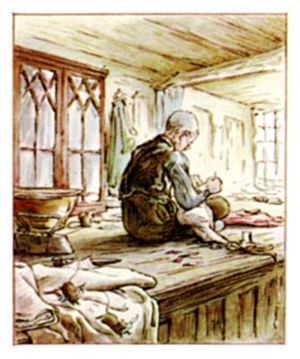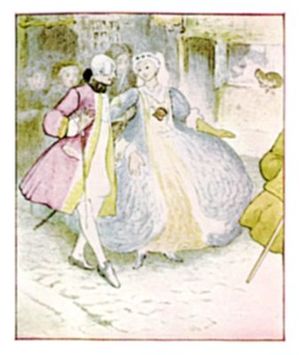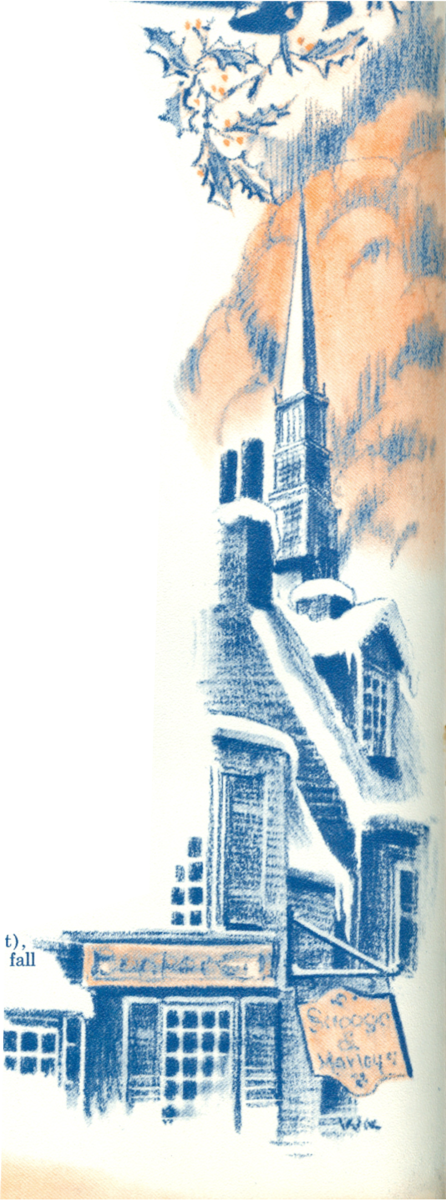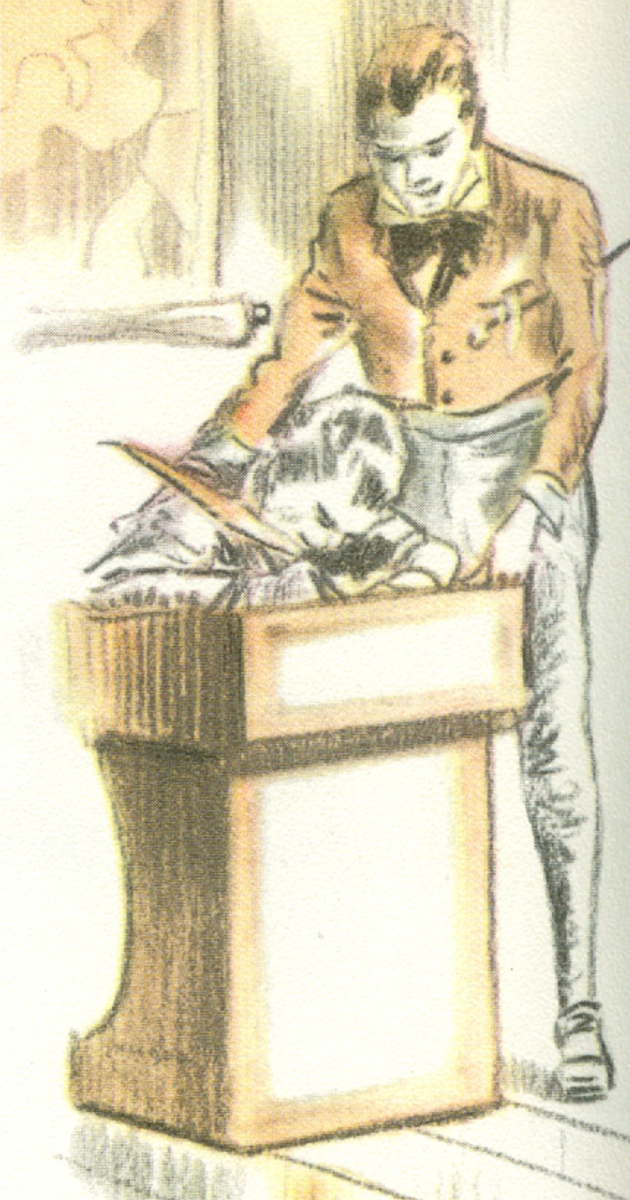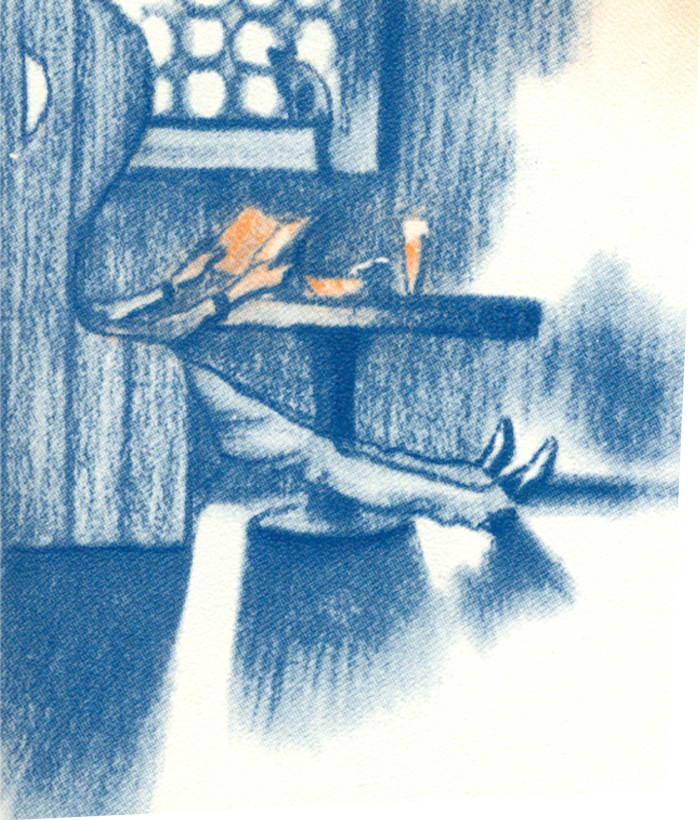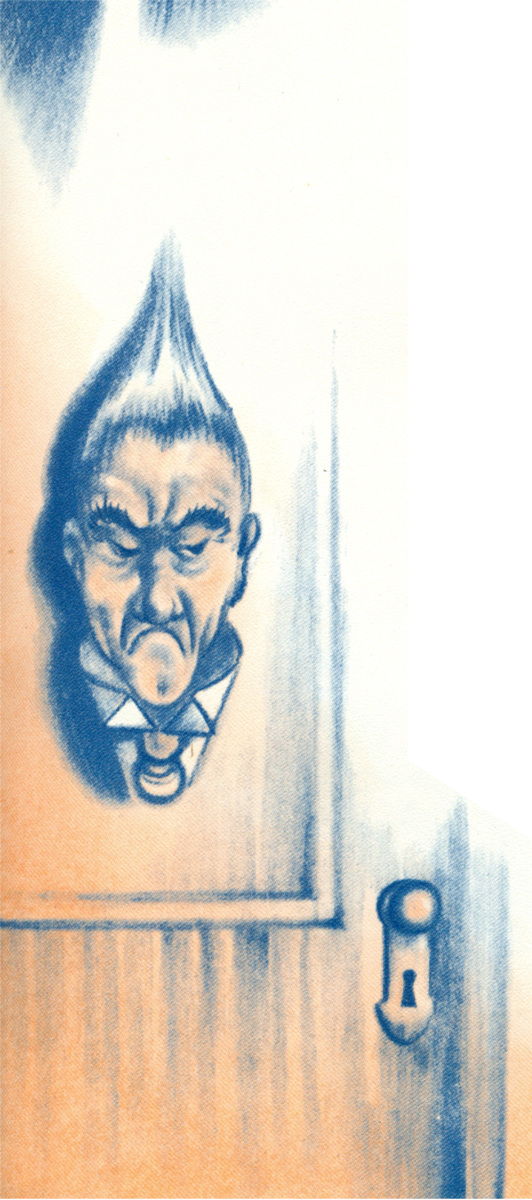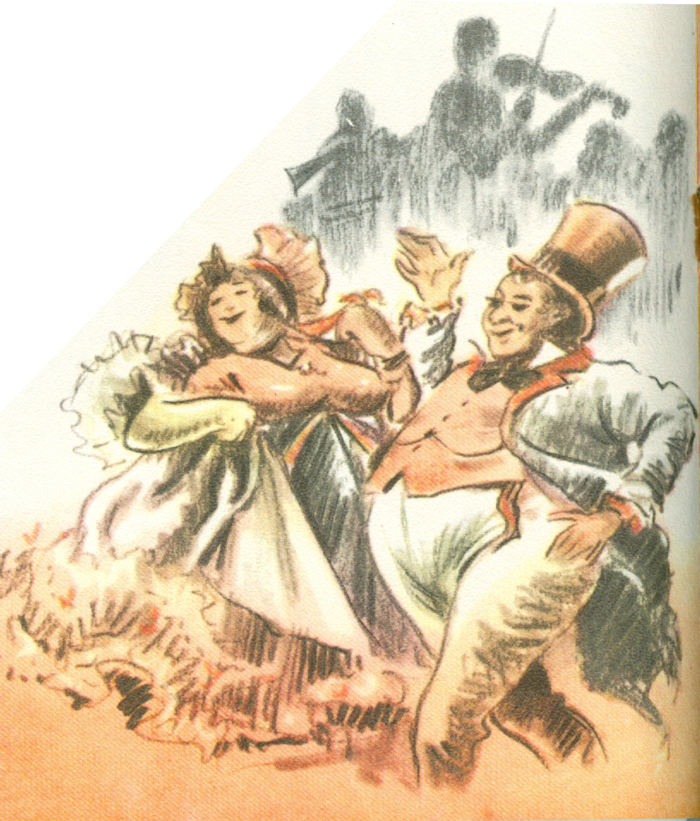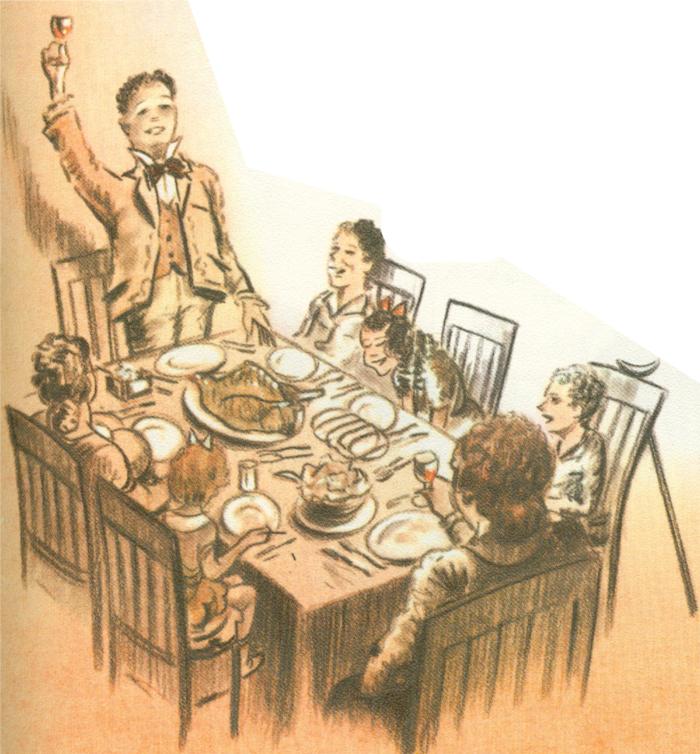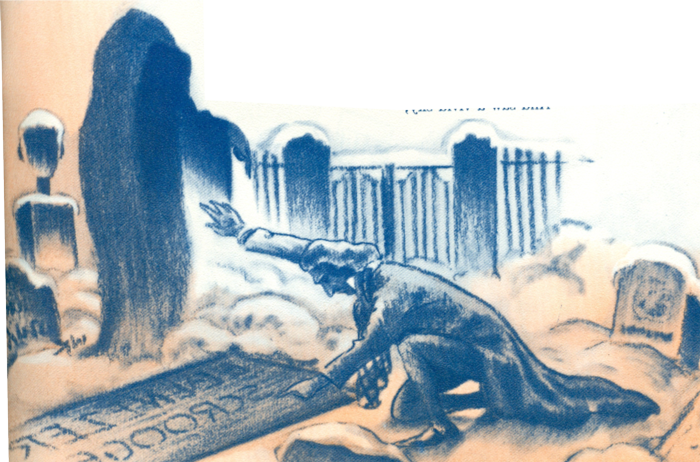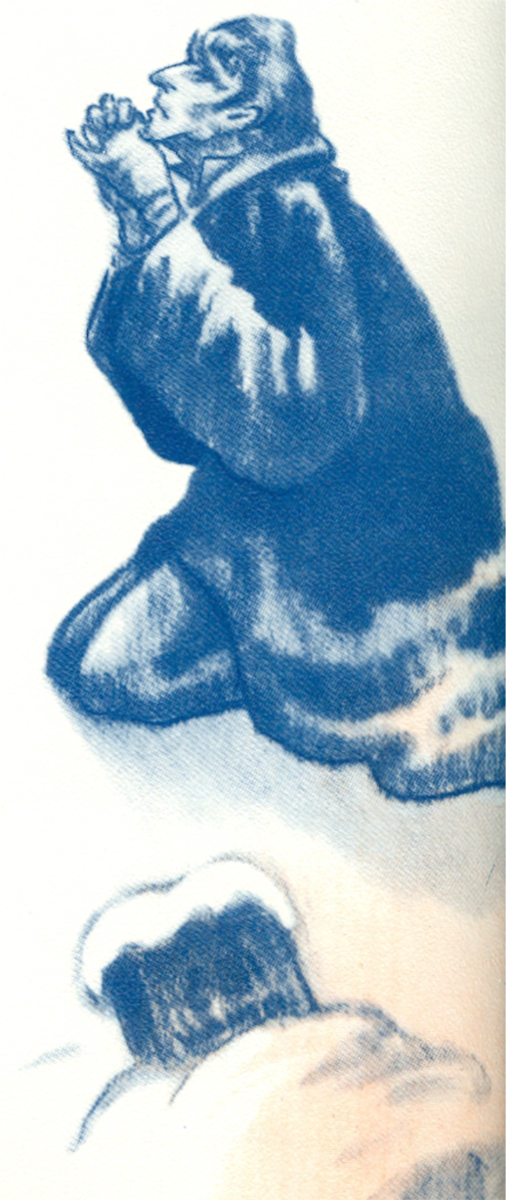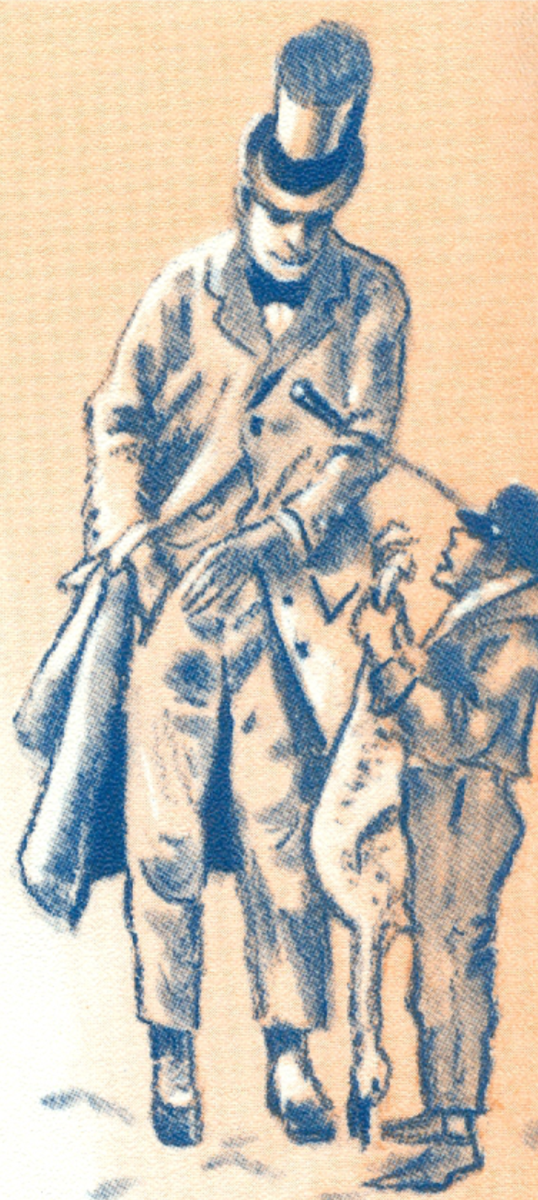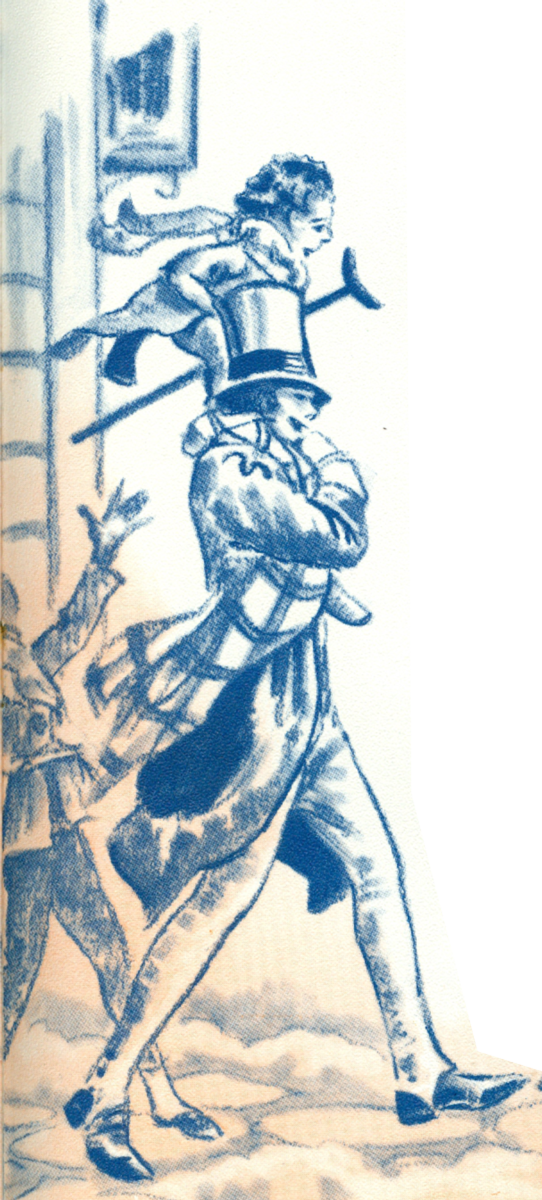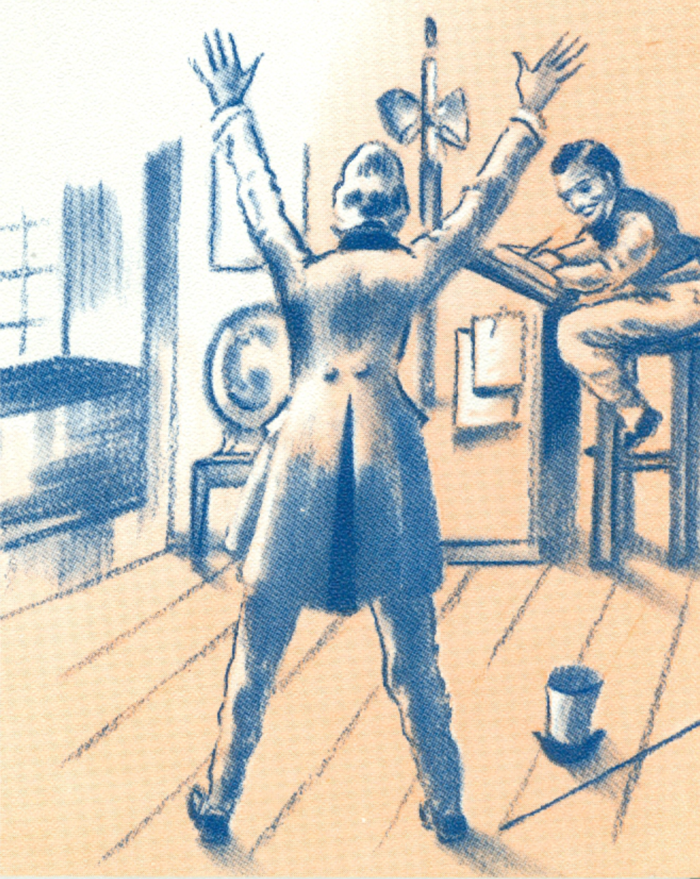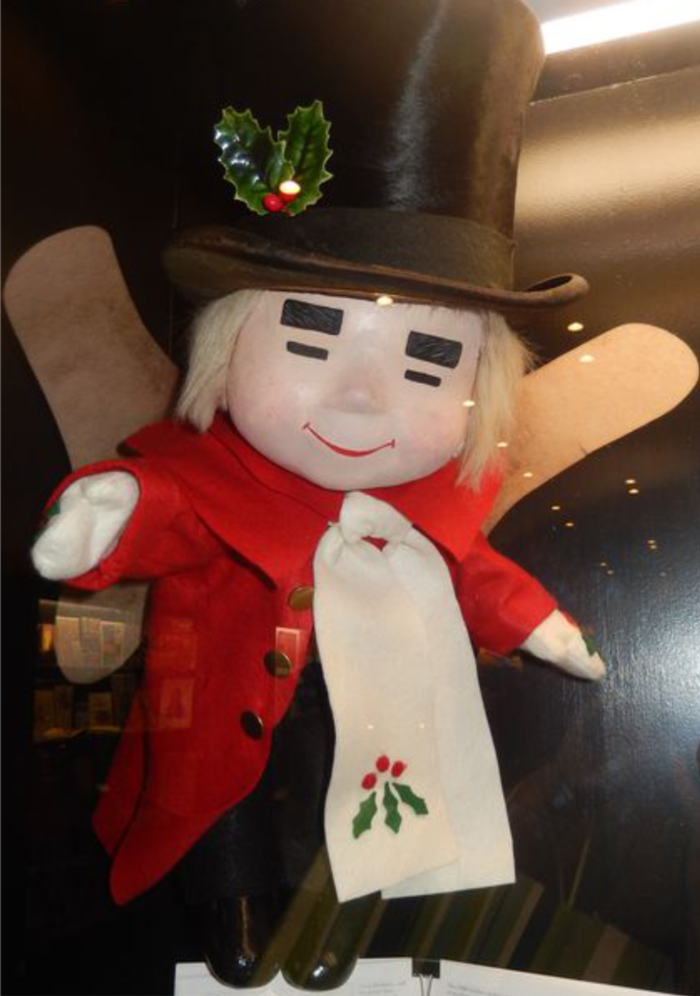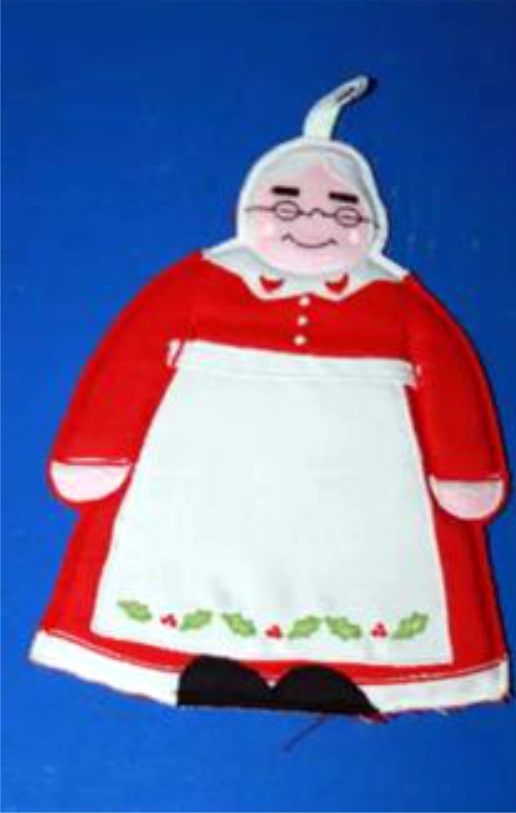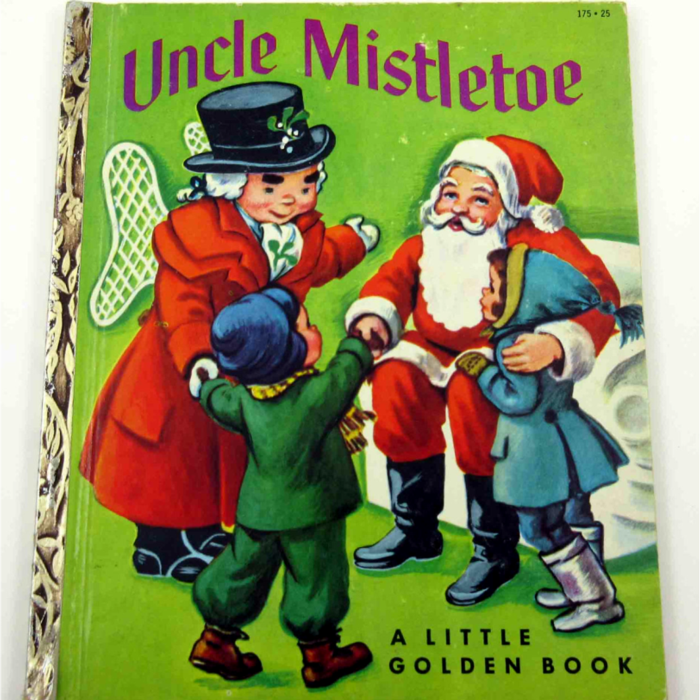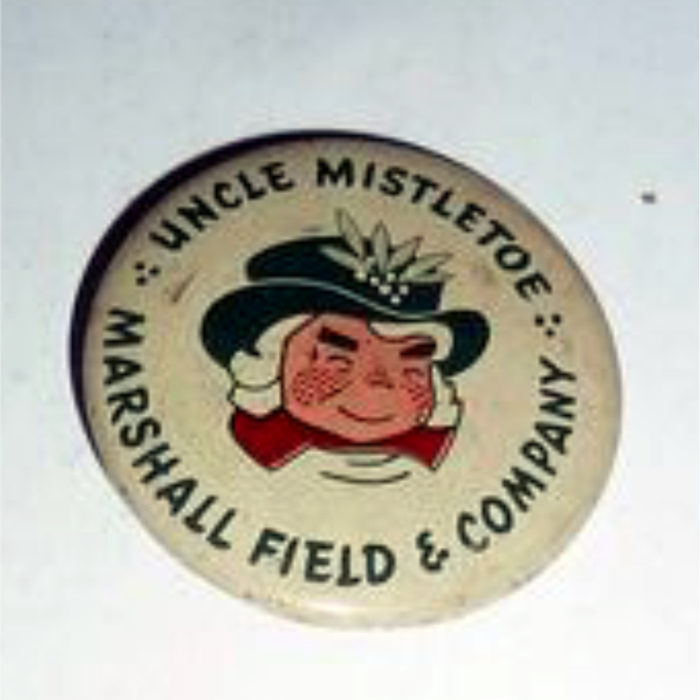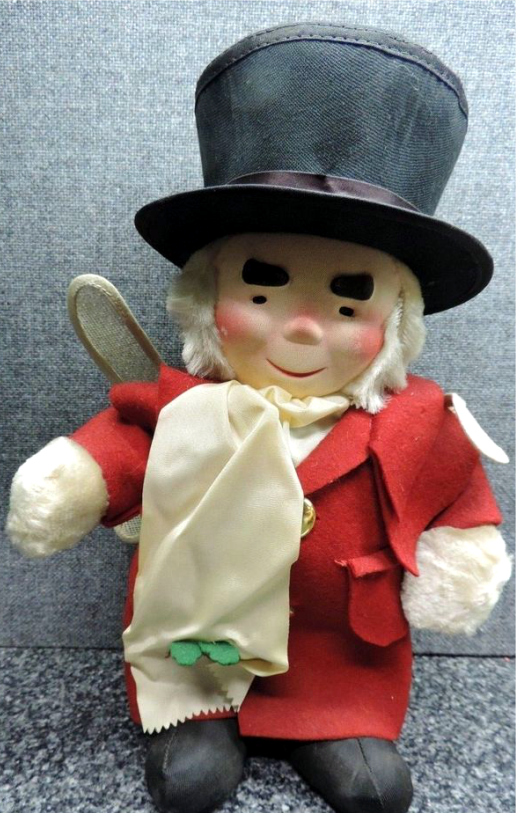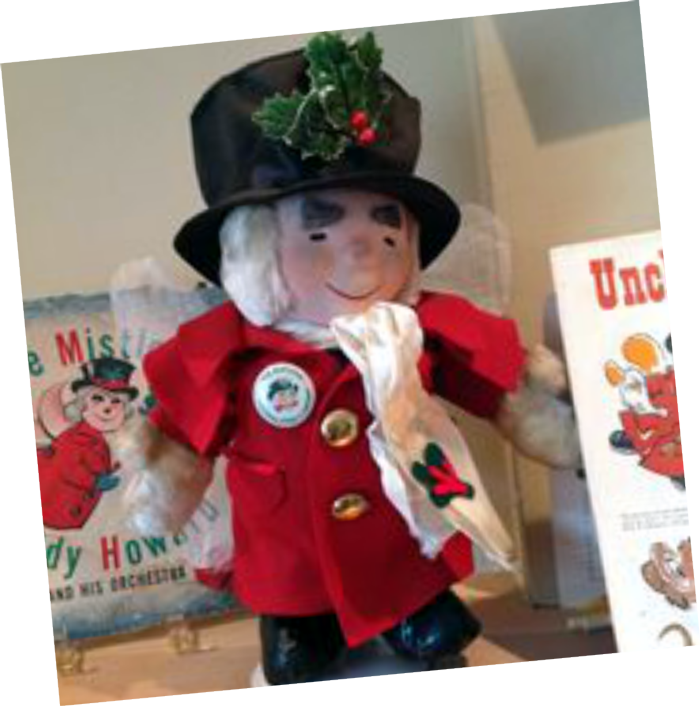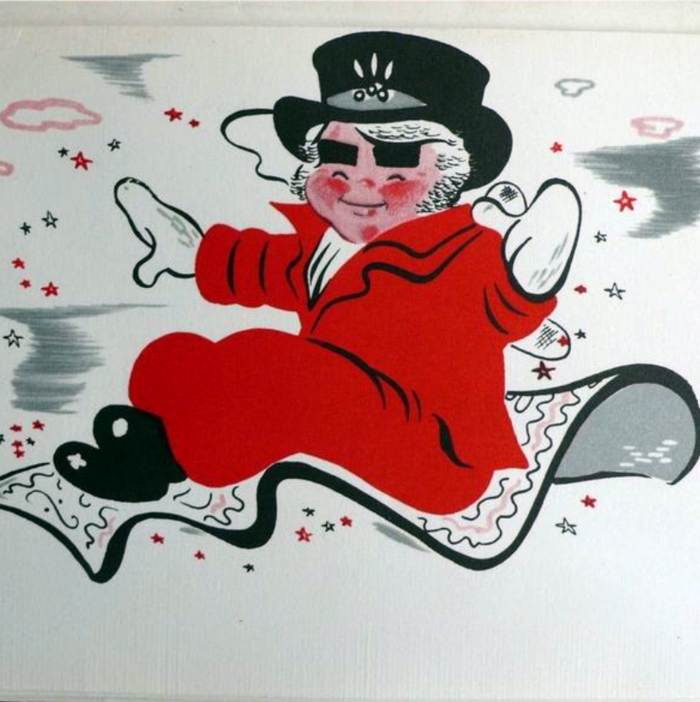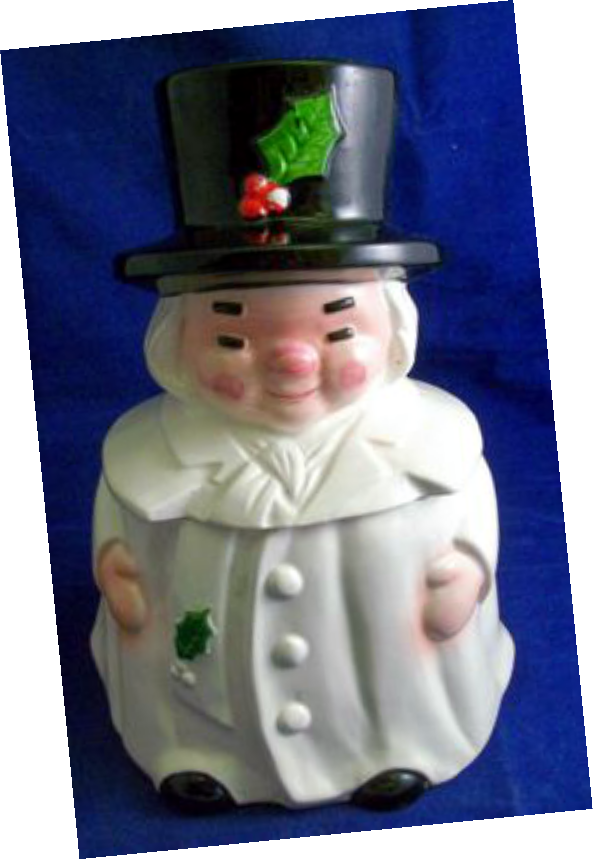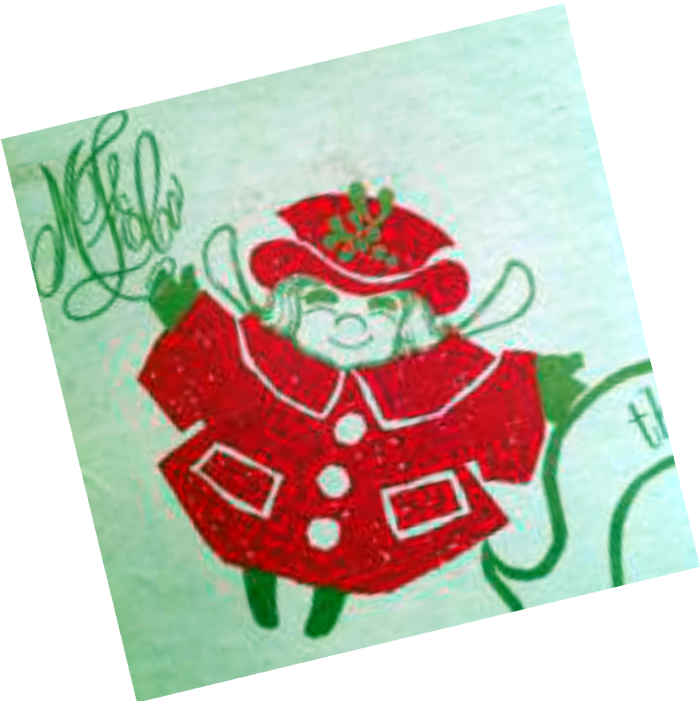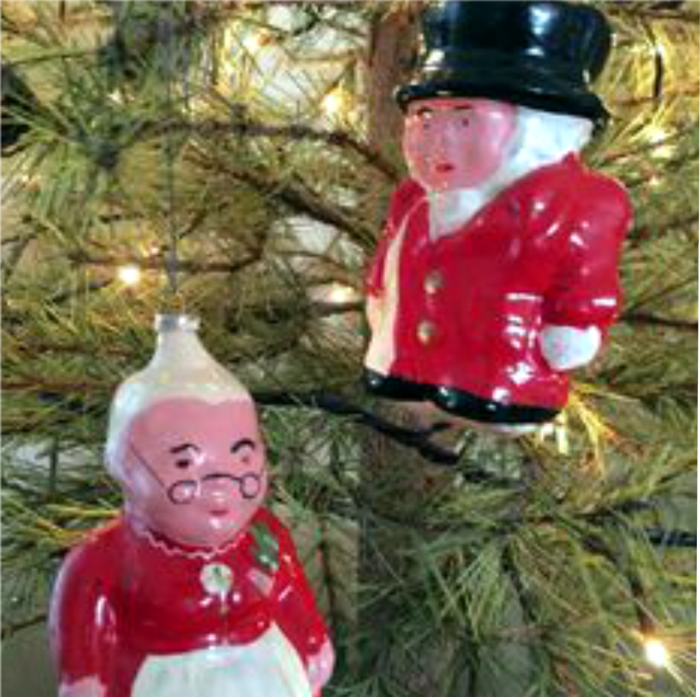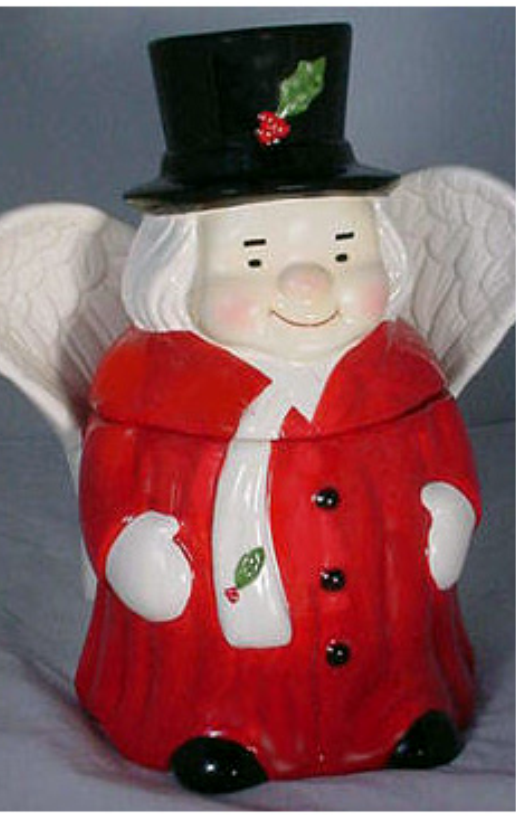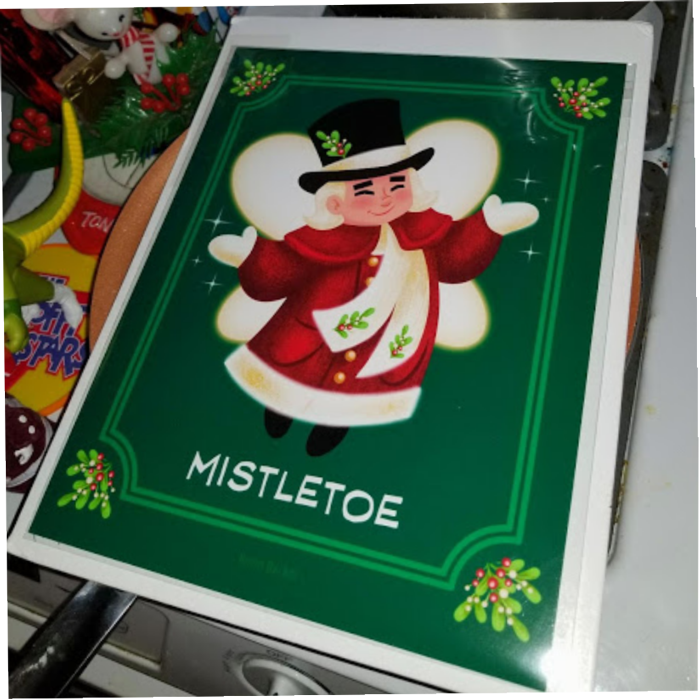Christmas Stories
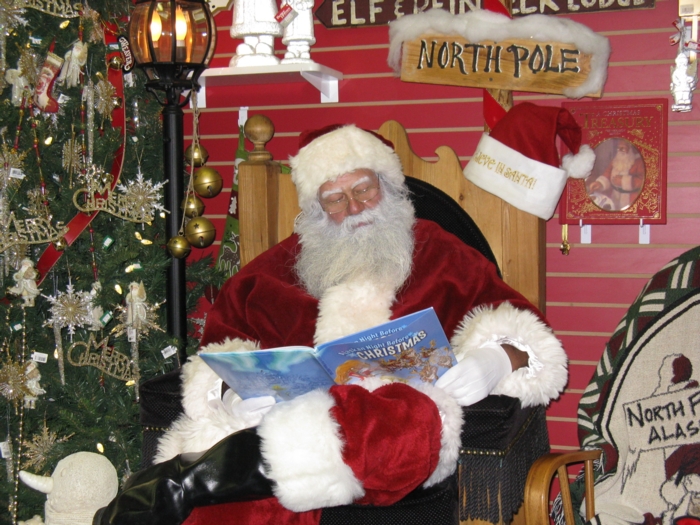
Christmas Short Stories
WHAT WOULD CHRISTMAS BE WITHOUT OUR FAVORITE STORIES that we review each year many of which -- like Rudolph -- make new appearances in book, song, toy, apparel, and film forms over the years. These tales are so special to us that we've no doubt passed them down to our children, nieces and nephews, and anyone else who'll listen.
Please add your favorites to those below by clicking the CONTACT US button at the top of this page to send me an email.
| THE NUTCRACKER | YES VIRGINIA | NIGHT BEFORE CHRISTMAS | UNCLE MISTLETOE |
| RUDOLPH RED-NOSED REINDEER | CHRISTMAS CAROL IN VERSE | HOW THE GRINCH STOLE CHRISTMAS | THE TAILOR OF GLOUCESTER |
| THE LITTLE MATCH GIRL | CHRISTMAS DREAM | SPIDER & CHRISTMAS TREE | LETTER TO SUSY CLEMENS |
| KIDNAPPED SANTA CLAUS |
A Kidnapped Santa Claus
By L. Frank Baum
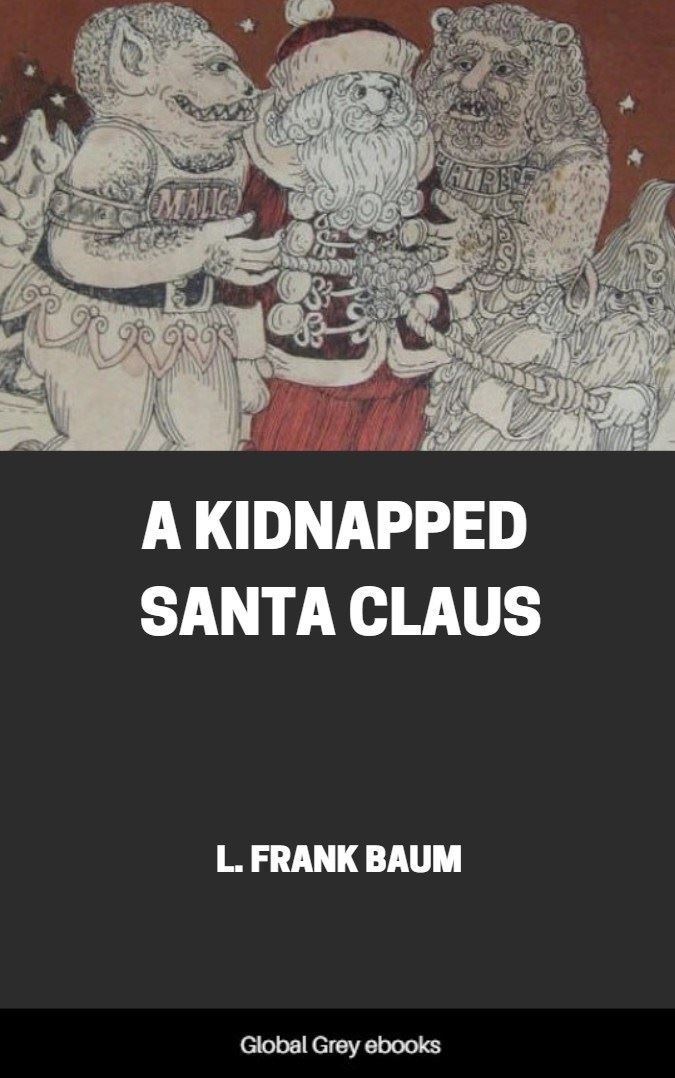 SANTA CLAUS LIVES IN THE LAUGHING VALLEY, where stands the big, rambling castle in which his toys are manufactured. His workmen, selected from the ryls, knooks, pixies and fairies, live with him, and every one is as busy as can be from one year's end to another.
SANTA CLAUS LIVES IN THE LAUGHING VALLEY, where stands the big, rambling castle in which his toys are manufactured. His workmen, selected from the ryls, knooks, pixies and fairies, live with him, and every one is as busy as can be from one year's end to another.
It is called the Laughing Valley because everything there is happy and gay. The brook chuckles to itself as it leaps rollicking between its green banks; the wind whistles merrily in the trees; the sunbeams dance lightly over the soft grass, and the violets and wild flowers look smilingly up from their green nests. To laugh one needs to be happy; to be happy one needs to be content. And throughout the Laughing Valley of Santa Claus contentment reigns supreme.
On one side is the mighty Forest of Burzee. At the other side stands the huge mountain that contains the Caves of the Daemons. And between them the Valley lies smiling and peaceful.
One would think that our good old Santa Claus, who devotes his days to making children happy, would have no enemies on all the earth; and, as a matter of fact, for a long period of time he encountered nothing but love wherever he might go.
But the Daemons who live in the mountain caves grew to hate Santa Claus very much, and all for the simple reason that he made children happy.
The Caves of the Daemons are five in number. A broad pathway leads up to the first cave, which is a finely arched cavern at the foot of the mountain, the entrance being beautifully carved and decorated. In it resides the Daemon of Selfishness. Back of this is another cavern inhabited by the Daemon of Envy. The cave of the Daemon of Hatred is next in order, and through this one passes to the home of the Daemon of Malice -- situated in a dark and fearful cave in the very heart of the mountain. I do not know what lies beyond this. Some say there are terrible pitfalls leading to death and destruction, and this may very well be true. However, from each one of the four caves mentioned there is a small, narrow tunnel leading to the fifth cave -- a cozy little room occupied by the Daemon of Repentance. And as the rocky floors of these passages are well worn by the track of passing feet, I judge that many wanderers in the Caves of the Daemons have escaped through the tunnels to the abode of the Daemon of Repentance, who is said to be a pleasant sort of fellow who gladly opens for one a little door admitting you into fresh air and sunshine again.
Well, these Daemons of the Caves, thinking they had great cause to dislike old Santa Claus, held a meeting one day to discuss the matter.
"I'm really getting lonesome," said the Daemon of Selfishness. "For Santa Claus distributes so many pretty Christmas gifts to all the children that they become happy and generous, through his example, and keep away from my cave."
"I'm having the same trouble," rejoined the Daemon of Envy. "The little ones seem quite content with Santa Claus, and there are few, indeed, that I can coax to become envious."
"And that makes it bad for me!" declared the Daemon of Hatred. "For if no children pass through the Caves of Selfishness and Envy, none can get to MY cavern."
"Or to mine," added the Daemon of Malice.
"For my part," said the Daemon of Repentance, "it is easily seen that if children do not visit your caves they have no need to visit mine; so that I am quite as neglected as you are."
"And all because of this person they call Santa Claus!" exclaimed the Daemon of Envy. "He is simply ruining our business, and something must be done at once."
To this they readily agreed; but what to do was another and more difficult matter to settle. They knew that Santa Claus worked all through the year at his castle in the Laughing Valley, preparing the gifts he was to distribute on Christmas Eve; and at first they resolved to try to tempt him into their caves, that they might lead him on to the terrible pitfalls that ended in destruction.
So the very next day, while Santa Claus was busily at work, surrounded by his little band of assistants, the Daemon of Selfishness came to him and said:
"These toys are wonderfully bright and pretty. Why do you not keep them for yourself? It's a pity to give them to those noisy boys and fretful girls, who break and destroy them so quickly."
"Nonsense!" cried the old graybeard, his bright eyes twinkling merrily as he turned toward the tempting Daemon. "The boys and girls are never so noisy and fretful after receiving my presents, and if I can make them happy for one day in the year I am quite content."
So the Daemon went back to the others, who awaited him in their caves, and said:
"I have failed, for Santa Claus is not at all selfish."
The following day the Daemon of Envy visited Santa Claus. Said he: "The toy shops are full of playthings quite as pretty as those you are making. What a shame it is that they should interfere with your business! They make toys by machinery much quicker than you can make them by hand; and they sell them for money, while you get nothing at all for your work."
But Santa Claus refused to be envious of the toy shops.
"I can supply the little ones but once a year -- on Christmas Eve," he answered; "for the children are many, and I am but one. And as my work is one of love and kindness I would be ashamed to receive money for my little gifts. But throughout all the year the children must be amused in some way, and so the toy shops are able to bring much happiness to my little friends. I like the toy shops, and am glad to see them prosper."
In spite of the second rebuff, the Daemon of Hatred thought he would try to influence Santa Claus. So the next day he entered the busy workshop and said:
"Good morning, Santa! I have bad news for you."
"Then run away, like a good fellow," answered Santa Claus. "Bad news is something that should be kept secret and never told."
"You cannot escape this, however," declared the Daemon; "for in the world are a good many who do not believe in Santa Claus, and these you are bound to hate bitterly, since they have so wronged you."
"Stuff and rubbish!" cried Santa.
"And there are others who resent your making children happy and who sneer at you and call you a foolish old rattlepate! You are quite right to hate such base slanderers, and you ought to be revenged upon them for their evil words."
"But I don't hate 'em!" exclaimed Santa Claus positively. "Such people do me no real harm, but merely render themselves and their children unhappy. Poor things! I'd much rather help them any day than injure them."
Indeed, the Daemons could not tempt old Santa Claus in any way. On the contrary, he was shrewd enough to see that their object in visiting him was to make mischief and trouble, and his cheery laughter disconcerted the evil ones and showed to them the folly of such an undertaking. So they abandoned honeyed words and determined to use force.
It was well known that no harm can come to Santa Claus while he is in the Laughing Valley, for the fairies, and ryls, and knooks all protect him. But on Christmas Eve he drives his reindeer out into the big world, carrying a sleighload of toys and pretty gifts to the children; and this was the time and the occasion when his enemies had the best chance to injure him. So the Daemons laid their plans and awaited the arrival of Christmas Eve.
The moon shone big and white in the sky, and the snow lay crisp and sparkling on the ground as Santa Claus cracked his whip and sped away out of the Valley into the great world beyond. The roomy sleigh was packed full with huge sacks of toys, and as the reindeer dashed onward our jolly old Santa laughed and whistled and sang for very joy. For in all his merry life this was the one day in the year when he was happiest -- the day he lovingly bestowed the treasures of his workshop upon the little children.
It would be a busy night for him, he well knew. As he whistled and shouted and cracked his whip again, he reviewed in mind all the towns and cities and farmhouses where he was expected, and figured that he had just enough presents to go around and make every child happy. The reindeer knew exactly what was expected of them, and dashed along so swiftly that their feet scarcely seemed to touch the snow-covered ground.
Suddenly a strange thing happened: a rope shot through the moonlight and a big noose that was in the end of it settled over the arms and body of Santa Claus and drew tight. Before he could resist or even cry out he was jerked from the seat of the sleigh and tumbled head foremost into a snowbank, while the reindeer rushed onward with the load of toys and carried it quickly out of sight and sound.
Such a surprising experience confused old Santa for a moment, and when he had collected his senses he found that the wicked Daemons had pulled him from the snowdrift and bound him tightly with many coils of the stout rope. And then they carried the kidnapped Santa Claus away to their mountain, where they thrust the prisoner into a secret cave and chained him to the rocky wall so that he could not escape.
"Ha, ha!" laughed the Daemons, rubbing their hands together with cruel glee. "What will the children do now? How they will cry and scold and storm when they find there are no toys in their stockings and no gifts on their Christmas trees! And what a lot of punishment they will receive from their parents, and how they will flock to our Caves of Selfishness, and Envy, and Hatred, and Malice! We have done a mighty clever thing, we Daemons of the Caves!"
Now it so chanced that on this Christmas Eve the good Santa Claus had taken with him in his sleigh Nuter the Ryl, Peter the Knook, Kilter the Pixie, and a small fairy named Wisk -- his four favorite assistants. These little people he had often found very useful in helping him to distribute his gifts to the children, and when their master was so suddenly dragged from the sleigh they were all snugly tucked underneath the seat, where the sharp wind could not reach them.
The tiny immortals knew nothing of the capture of Santa Claus until some time after he had disappeared. But finally they missed his cheery voice, and as their master always sang or whistled on his journeys, the silence warned them that something was wrong.
Little Wisk stuck out his head from underneath the seat and found Santa Claus gone and no one to direct the flight of the reindeer.
"Whoa!" he called out, and the deer obediently slackened speed and came to a halt.
Peter and Nuter and Kilter all jumped upon the seat and looked back over the track made by the sleigh. But Santa Claus had been left miles and miles behind.
"What shall we do?" asked Wisk anxiously, all the mirth and mischief banished from his wee face by this great calamity.
"We must go back at once and find our master," said Nuter the Ryl, who thought and spoke with much deliberation.
"No, no!" exclaimed Peter the Knook, who, cross and crabbed though he was, might always be depended upon in an emergency. "If we delay, or go back, there will not be time to get the toys to the children before morning; and that would grieve Santa Claus more than anything else."
"It is certain that some wicked creatures have captured him," added Kilter thoughtfully, "and their object must be to make the children unhappy. So our first duty is to get the toys distributed as carefully as if Santa Claus were himself present. Afterward we can search for our master and easily secure his freedom."
This seemed such good and sensible advice that the others at once resolved to adopt it. So Peter the Knook called to the reindeer, and the faithful animals again sprang forward and dashed over hill and valley, through forest and plain, until they came to the houses wherein children lay sleeping and dreaming of the pretty gifts they would find on Christmas morning.
The little immortals had set themselves a difficult task; for although they had assisted Santa Claus on many of his journeys, their master had always directed and guided them and told them exactly what he wished them to do. But now they had to distribute the toys according to their own judgment, and they did not understand children as well as did old Santa. So it is no wonder they made some laughable errors.
Mamie Brown, who wanted a doll, got a drum instead; and a drum is of no use to a girl who loves dolls. And Charlie Smith, who delights to romp and play out of doors, and who wanted some new rubber boots to keep his feet dry, received a sewing box filled with colored worsteds and threads and needles, which made him so provoked that he thoughtlessly called our dear Santa Claus a fraud.
Had there been many such mistakes the Daemons would have accomplished their evil purpose and made the children unhappy. But the little friends of the absent Santa Claus labored faithfully and intelligently to carry out their master's ideas, and they made fewer errors than might be expected under such unusual circumstances.
And, although they worked as swiftly as possible, day had begun to break before the toys and other presents were all distributed; so for the first time in many years the reindeer trotted into the Laughing Valley, on their return, in broad daylight, with the brilliant sun peeping over the edge of the forest to prove they were far behind their accustomed hours.
Having put the deer in the stable, the little folk began to wonder how they might rescue their master; and they realized they must discover, first of all, what had happened to him and where he was.
So Wisk the Fairy transported himself to the bower of the Fairy Queen, which was located deep in the heart of the Forest of Burzee; and once there, it did not take him long to find out all about the naughty Daemons and how they had kidnapped the good Santa Claus to prevent his making children happy. The Fairy Queen also promised her assistance, and then, fortified by this powerful support, Wisk flew back to where Nuter and Peter and Kilter awaited him, and the four counseled together and laid plans to rescue their master from his enemies.
It is possible that Santa Claus was not as merry as usual during the night that succeeded his capture. For although he had faith in the judgment of his little friends he could not avoid a certain amount of worry, and an anxious look would creep at times into his kind old eyes as he thought of the disappointment that might await his dear little children. And the Daemons, who guarded him by turns, one after another, did not neglect to taunt him with contemptuous words in his helpless condition.
When Christmas Day dawned the Daemon of Malice was guarding the prisoner, and his tongue was sharper than that of any of the others.
"The children are waking up, Santa!" he cried. "They are waking up to find their stockings empty! Ho, ho! How they will quarrel, and wail, and stamp their feet in anger! Our caves will be full today, old Santa! Our caves are sure to be full!"
But to this, as to other like taunts, Santa Claus answered nothing. He was much grieved by his capture, it is true; but his courage did not forsake him. And, finding that the prisoner would not reply to his jeers, the Daemon of Malice presently went away, and sent the Daemon of Repentance to take his place.
This last personage was not so disagreeable as the others. He had gentle and refined features, and his voice was soft and pleasant in tone.
"My brother Daemons do not trust me overmuch," said he, as he entered the cavern; "but it is morning, now, and the mischief is done. You cannot visit the children again for another year."
"That is true," answered Santa Claus, almost cheerfully; "Christmas Eve is past, and for the first time in centuries I have not visited my children."
"The little ones will be greatly disappointed," murmured the Daemon of Repentance, almost regretfully; "but that cannot be helped now. Their grief is likely to make the children selfish and envious and hateful, and if they come to the Caves of the Daemons today I shall get a chance to lead some of them to my Cave of Repentance."
"Do you never repent, yourself?" asked Santa Claus, curiously.
"Oh, yes, indeed," answered the Daemon. "I am even now repenting that I assisted in your capture. Of course it is too late to remedy the evil that has been done; but repentance, you know, can come only after an evil thought or deed, for in the beginning there is nothing to repent of."
"So I understand," said Santa Claus. "Those who avoid evil need never visit your cave."
"As a rule, that is true," replied the Daemon; "yet you, who have done no evil, are about to visit my cave at once; for to prove that I sincerely regret my share in your capture I am going to permit you to escape."
This speech greatly surprised the prisoner, until he reflected that it was just what might be expected of the Daemon of Repentance. The fellow at once busied himself untying the knots that bound Santa Claus and unlocking the chains that fastened him to the wall. Then he led the way through a long tunnel until they both emerged in the Cave of Repentance.
"I hope you will forgive me," said the Daemon pleadingly. "I am not really a bad person, you know; and I believe I accomplish a great deal of good in the world."
With this he opened a back door that let in a flood of sunshine, and Santa Claus sniffed the fresh air gratefully.
"I bear no malice," said he to the Daemon, in a gentle voice; "and I am sure the world would be a dreary place without you. So, good morning, and a Merry Christmas to you!"
With these words he stepped out to greet the bright morning, and a moment later he was trudging along, whistling softly to himself, on his way to his home in the Laughing Valley.
Marching over the snow toward the mountain was a vast army, made up of the most curious creatures imaginable. There were numberless knooks from the forest, as rough and crooked in appearance as the gnarled branches of the trees they ministered to. And there were dainty ryls from the fields, each one bearing the emblem of the flower or plant it guarded. Behind these were many ranks of pixies, gnomes and nymphs, and in the rear a thousand beautiful fairies floated along in gorgeous array.
This wonderful army was led by Wisk, Peter, Nuter, and Kilter, who had assembled it to rescue Santa Claus from captivity and to punish the Daemons who had dared to take him away from his beloved children.
And, although they looked so bright and peaceful, the little immortals were armed with powers that would be very terrible to those who had incurred their anger. Woe to the Daemons of the Caves if this mighty army of vengeance ever met them!
But lo! coming to meet his loyal friends appeared the imposing form of Santa Claus, his white beard floating in the breeze and his bright eyes sparkling with pleasure at this proof of the love and veneration he had inspired in the hearts of the most powerful creatures in existence.
And while they clustered around him and danced with glee at his safe return, he gave them earnest thanks for their support. But Wisk, and Nuter, and Peter, and Kilter, he embraced affectionately.
"It is useless to pursue the Daemons," said Santa Claus to the army. "They have their place in the world, and can never be destroyed. But that is a great pity, nevertheless," he continued musingly.
So the fairies, and knooks, and pixies, and ryls all escorted the good man to his castle, and there left him to talk over the events of the night with his little assistants.
Wisk had already rendered himself invisible and flown through the big world to see how the children were getting along on this bright Christmas morning; and by the time he returned, Peter had finished telling Santa Claus of how they had distributed the toys.
"We really did very well," cried the fairy, in a pleased voice; "for I found little unhappiness among the children this morning. Still, you must not get captured again, my dear master; for we might not be so fortunate another time in carrying out your ideas."
He then related the mistakes that had been made, and which he had not discovered until his tour of inspection. And Santa Claus at once sent him with rubber boots for Charlie Smith, and a doll for Mamie Brown; so that even those two disappointed ones became happy.
As for the wicked Daemons of the Caves, they were filled with anger and chagrin when they found that their clever capture of Santa Claus had come to naught. Indeed, no one on that Christmas Day appeared to be at all selfish, or envious, or hateful. And, realizing that while the children's saint had so many powerful friends it was folly to oppose him, the Daemons never again attempted to interfere with his journeys on Christmas Eve.
| Return to Index |
The Spider and the Christmas Tree
(A UKRAINIAN CHRISTMAS STORY)
Some animals are enshrined as Christmas icons, like reindeer, partridges and polar bears. Spiders, on the other hand, are less widely associated with holiday cheer. To many people, the only times to celebrate spiders are Halloween and never.
That's not the case everywhere, though. While Americans don't typically include spiders in their canon of Christmas creatures, the arachnids are yuletide mainstays in some parts of the world, namely a swath of Europe from Ukraine to Germany.
This is largely due to the legend of the Christmas spider, a European folktale that offers a mythical backstory for tinsel on Christmas trees. And although the story itself is fictional, it still features an uncommonly fair portrayal of spiders as non-monsters. There are several versions, but the spiders generally range from benevolent to beneficial. And by encouraging people to symbolically embrace house spiders via spider-shaped ornaments, this tradition weaves a subtle message about coexistence that, as with many holiday fables, resonates well beyond Christmas.
THERE ONCE WAS A WIDOW who lived in a cramped old hut. She lived with her children. Outside their home was a tall pine tree. From the tree dropped a pine cone that soon started to grow from the soil.
The children were excited about the prospect of having a Christmas tree, and so they tended to it, ensuring that it would continue to grow and be strong until it became tall enough to be a Christmas tree to take inside their home.
Unfortunately, the family was poor and even though they had a Christmas tree, they couldn’t afford to decorate it with ornaments for Christmas. And so on Christmas eve, the widow and her children went to bed knowing that they would have a bare Christmas tree on Christmas morning.
The spiders in the hut heard the sobs of the children and sad cries, and decided they would not leave the Christmas tree bare.
So the spiders created beautiful webs on the Christmas tree, decorating it with elegant and beautiful silky patterns.
When the children woke up early on Christmas morning they were jumping for excitement. They went to their mother and woke her up. “Mother, you have to come see the Christmas tree. It’s so beautiful!”
As the mother woke and stood in front of the tree, she was truly amazed at the sight that lay before her eyes.
One of the children opened up the window as the sun was shining. The sun would slide along the floor and slowly glide up the Christmas tree and onto the webs. As the rays of the sun shone on the tree, the webs turned into glittering silver and gold colour; making the Christmas tree dazzle and sparkle with a magical twinkle.
From that day forward the widow never felt poor, instead she was always grateful for all the wonderful gifts she already had in life.
This is why you will see Ukrainians decorate their Christmas tree with a spider web. It’s believed that the webs will bring good fortune and luck for the upcoming year.
| Return to Index |
A Christmas Dream, and How It Came to Be True
By Louisa May Alcott
Characterized as "Dickens' A Christmas Carol for children." This short story appeared in The Louisa May Alcott Reader: A Supplementary Reader for the Fourth Year of School in 1908.
"I'M SO TIRED OF CHRISTMAS. I wish there never would be another one!" exclaimed a discontented-looking little girl, as she sat idly watching her mother arrange a pile of gifts two days before they were to be given."Why, Effie, what a dreadful thing to say! You are as bad as old Scrooge; and I'm afraid something will happen to you, as it did to him, if you don't care for dear Christmas," answered mamma, almost dropping the silver horn she was filling with delicious candies.
never would be another one!" exclaimed a discontented-looking little girl, as she sat idly watching her mother arrange a pile of gifts two days before they were to be given."Why, Effie, what a dreadful thing to say! You are as bad as old Scrooge; and I'm afraid something will happen to you, as it did to him, if you don't care for dear Christmas," answered mamma, almost dropping the silver horn she was filling with delicious candies.
"Who was Scrooge? What happened to him?" asked Effie, with a glimmer of interest in her listless face, as she picked out the sourest lemon-drop she could find; for nothing sweet suited her just then.
"He was one of Dickens's best people, and you can read the charming story some day. He hated Christmas until a strange dream showed him how dear and beautiful it was, and made a better man of him."
"I shall read it; for I like dreams, and have a great many curious ones myself. But they don't keep me from being tired of Christmas," said Effie, poking discontentedly among the sweeties for something worth eating.
"Why are you tired of what should be the happiest time of all the year?" asked mamma, anxiously.
"Perhaps I shouldn't be if I had something new. But it is always the same, and there isn't any more surprise about it. I always find heaps of goodies in my stocking. Don't like some of them, and soon get tired of those I do like. We always have a great dinner, and I eat too much, and feel ill next day. Then there is a Christmas tree somewhere, with a doll on top, or a stupid old Santa Claus, and children dancing and screaming over bonbons and toys that break, and shiny things that are of no use. Really, mamma, I've had so many Christmases all alike that I don't think I can bear another one." And Effie laid herself flat on the sofa, as if the mere idea was too much for her.
Her mother laughed at her despair, but was sorry to see her little girl so discontented, when she had everything to make her happy, and had known but ten Christmas days.
"Suppose we don't give you any presents at all,--how would that suit you?" asked mamma, anxious to please her spoiled child.
"I should like one large and splendid one, and one dear little one, to remember some very nice person by," said Effie, who was a fanciful little body, full of odd whims and notions, which her friends loved to gratify, regardless of time, trouble, or money; for she was the last of three little girls, and very dear to all the family.
"Well, my darling, I will see what I can do to please you, and not say a word until all is ready. If I could only get a new idea to start with!" And mamma went on tying up her pretty bundles with a thoughtful face, while Effie strolled to the window to watch the rain that kept her in-doors and made her dismal.
"Seems to me poor children have better times than rich ones. I can't go out, and there is a girl about my age splashing along, without any maid to fuss about rubbers and cloaks and umbrellas and colds. I wish I was a beggar-girl."
"Would you like to be hungry, cold, and ragged, to beg all day, and sleep on an ash-heap at night?" asked mamma, wondering what would come next.
"Cinderella did, and had a nice time in the end. This girl out here has a basket of scraps on her arm, and a big old shawl all round her, and doesn't seem to care a bit, though the water runs out of the toes of her boots. She goes paddling along, laughing at the rain, and eating a cold potato as if it tasted nicer than the chicken and ice-cream I had for dinner. Yes, I do think poor children are happier than rich ones."
"So do I, sometimes. At the Orphan Asylum today I saw two dozen merry little souls who have no parents, no home, and no hope of Christmas beyond a stick of candy or a cake. I wish you had been there to see how happy they were, playing with the old toys some richer children had sent them."
"You may give them all mine; I'm so tired of them I never want to see them again," said Effie, turning from the window to the pretty baby-house full of everything a child's heart could desire.
"I will, and let you begin again with something you will not tire of, if I can only find it." And mamma knit her brows trying to discover some grand surprise for this child who didn't care for Christmas.
Nothing more was said then; and wandering off to the library, Effie found "A Christmas Carol," and curling herself up in the sofa corner, read it all before tea. Some of it she did not understand; but she laughed and cried over many parts of the charming story, and felt better without knowing why.
All the evening she thought of poor Tiny Tim, Mrs. Cratchit with the pudding, and the stout old gentleman who danced so gayly that "his legs twinkled in the air." Presently bedtime arrived.
"Come, now, and toast your feet," said Effie's nurse, "while I do your pretty hair and tell stories." "I'll have a fairy tale to-night, a very interesting one," commanded Effie, as she put on her blue silk wrapper and little fur-lined slippers to sit before the fire and have her long curls brushed.
So Nursey told her best tales; and when at last the child lay down under her lace curtains, her head was full of a curious jumble of Christmas elves, poor children, snow-storms, sugarplums, and surprises. So it is no wonder that she dreamed all night; and this was the dream, which she never quite forgot.
She found herself sitting on a stone, in the middle of a great field, all alone. The snow was falling fast, a bitter wind whistled by, and night was coming on. She felt hungry, cold, and tired, and did not know where to go nor what to do.
"I wanted to be a beggar-girl, and now I am one; but I don't like it, and wish somebody would come and take care of me. I don't know who I am, and I think I must be lost," thought Effie, with the curious interest one takes in one's self in dreams. But the more she thought about it, the more bewildered she felt. Faster fell the snow, colder blew the wind, darker grew the night; and poor Effie made up her mind that she was quite forgotten and left to freeze alone. The tears were chilled on her cheeks, her feet felt like icicles, and her heart died within her, so hungry, frightened, and forlorn was she. Laying her head on her knees, she gave herself up for lost, and sat there with the great flakes fast turning her to a little white mound, when suddenly the sound of music reached her, and starting up, she looked and listened with all her eyes and ears.
Far away a dim light shone, and a voice was heard singing. She tried to run toward the welcome glimmer, but could not stir, and stood like a small statue of expectation while the light drew nearer, and the sweet words of the song grew clearer.
From our happy home
Through the world we roam
One week in all the year,
Making winter spring
With the joy we bring,
For Christmas-tide is here.
Now the eastern star
Shines from afar
To light the poorest home;
Hearts warmer grow,
Gifts freely flow,
For Christmas-tide has come.
Now gay trees rise
Before young eyes,
Abloom with tempting cheer;
Blithe voices sing,
And blithe bells ring,
For Christmas-tide is here.
Oh, happy chime,
Oh, blessed time,
That draws us all so near!
"Welcome, dear day,"
All creatures say,
For Christmas-tide is here.
A child's voice sang, a child's hand carried the little candle; and in the circle of soft light it shed, Effie saw a pretty child coming to her through the night and snow. A rosy, smiling creature, wrapped in white fur, with a wreath of green and scarlet holly on its shining hair, the magic candle in one hand, and the other outstretched as if to shower gifts and warmly press all other hands.
Effie forgot to speak as this bright vision came nearer, leaving no trace of footsteps in the snow, only lighting the way with its little candle, and filling the air with the music of its song.
"Dear child, you are lost, and I have come to find you," said the stranger, taking Effie's cold hands in his, with a smile like sunshine, while every holly berry glowed like a little fire.
"Do you know me?" asked Effie, feeling no fear, but a great gladness, at his coming.
"I know all children, and go to find them; for this is my holiday, and I gather them from all parts of the world to be merry with me once a year."
"Are you an angel?" asked Effie, looking for the wings.
"No; I am a Christmas spirit, and live with my mates in a pleasant place, getting ready for our holiday, when we are let out to roam about the world, helping make this a happy time for all who will let us in. Will you come and see how we work?" "I will go anywhere with you. Don't leave me again," cried Effie, gladly.
"First I will make you comfortable. That is what we love to do. You are cold, and you shall be warm, hungry, and I will feed you; sorrowful, and I will make you gay."
With a wave of his candle all three miracles were wrought,--for the snow- flakes turned to a white fur cloak and hood on Effie's head and shoulders, a bowl of hot soup came sailing to her lips, and vanished when she had eagerly drunk the last drop; and suddenly the dismal field changed to a new world so full of wonders that all her troubles were forgotten in a minute. Bells were ringing so merrily that it was hard to keep from dancing. Green garlands hung on the walls, and every tree was a Christmas tree full of toys, and blazing with candles that never went out.
In one place many little spirits sewed like mad on warm clothes, turning off work faster than any sewing-machine ever invented, and great piles were made ready to be sent to poor people. Other busy creatures packed money into purses, and wrote checks which they sent flying away on the wind,--a lovely kind of snow-storm to fall into a world below full of poverty. Older and graver spirits were looking over piles of little books, in which the records of the past year were kept, telling how different people had spent it, and what sort of gifts they deserved. Some got peace, some disappointment, some remorse and sorrow, some great joy and hope. The rich had generous thoughts sent them; the poor, gratitude and contentment. Children had more love and duty to parents; and parents renewed patience, wisdom, and satisfaction for and in their children. No one was forgotten.
"Please tell me what splendid place this is?" asked Effie, as soon as she could collect her wits after the first look at all these astonishing things.
"This is the Christmas world; and here we work all the year round, never tired of getting ready for the happy day. See, these are the saints just setting off; for some have far to go, and the children must not be disappointed."
As he spoke the spirit pointed to four gates, out of which four great sleighs were just driving, laden with toys, while a jolly old Santa Claus sat in the middle of each, drawing on his mittens and tucking up his wraps for a long cold drive. "Why, I thought there was only one Santa Claus, and even he was a humbug," cried Effie, astonished at the sight. "Never give up your faith in the sweet old stones, even after you come to see that they are only the pleasant shadow of a lovely truth."
Just then the sleighs went off with a great jingling of bells and pattering of reindeer hoofs, while all the spirits gave a cheer that was heard in the lower world, where people said, "Hear the stars sing."
"I never will say there isn't any Santa Claus again. Now, show me more."
"You will like to see this place, I think, and may learn something here perhaps."
The spirit smiled as he led the way to a little door, through which Effie peeped into a world of dolls. Baby-houses were in full blast, with dolls of all sorts going on like live people. Waxen ladies sat in their parlors elegantly dressed; black dolls cooked in the kitchens; nurses walked out with the bits of dollies; and the streets were full of tin soldiers marching, wooden horses prancing, express wagons rumbling, and little men hurrying to and fro. Shops were there, and tiny people buying legs of mutton, pounds of tea, mites of clothes, and everything dolls use or wear or want.
But presently she saw that in some ways the dolls improved upon the manners and customs of human beings, and she watched eagerly to learn why they did these things. A fine Paris doll driving in her carriage took up a black worsted Dinah who was hobbling along with a basket of clean clothes, and carried her to her journey's end, as if it were the proper thing to do. Another interesting china lady took off her comfortable red cloak and put it round a poor wooden creature done up in a paper shift, and so badly painted that its face would have sent some babies into fits.
"Seems to me I once knew a rich girl who didn't give her things to poor girls. I wish I could remember who she was, and tell her to be as kind as that china doll," said Effie, much touched at the sweet way the pretty creature wrapped up the poor fright, and then ran off in her little gray gown to buy a shiny fowl stuck on a wooden platter for her invalid mother's dinner.
"We recall these things to people's minds by dreams. I think the girl you speak of won't forget this one." And the spirit smiled, as if he enjoyed some joke which she did not see.
A little bell rang as she looked, and away scampered the children into the red-and-green school-house with the roof that lifted up, so one could see how nicely they sat at their desks with mites of books, or drew on the inch-square blackboards with crumbs of chalk.
"They know their lessons very well, and are as still as mice. We make a great racket at our school, and get bad marks every day. I shall tell the girls they had better mind what they do, or their dolls will be better scholars than they are," said Effie, much impressed, as she peeped in and saw no rod in the hand of the little mistress, who looked up and shook her head at the intruder, as if begging her to go away before the order of the school was disturbed.
Effie retired at once, but could not resist one look in at the window of a fine mansion, where the family were at dinner, the children behaved so well at table, and never grumbled a bit when their mamma said they could not have any more fruit. "Now, show me something else," she said, as they came again to the low door that led out of Doll-land. "You have seen how we prepare for Christmas; let me show you where we love best to send our good and happy gifts," answered the spirit, giving her his hand again.
"I know. I've seen ever so many," began Effie, thinking of her own Christmases.
"No, you have never seen what I will show you. Come away, and remember what you see to-night."
Like a flash that bright world vanished, and Effie found herself in a part of the city she had never seen before. It was far away from the gayer places, where every store was brilliant with lights and full of pretty things, and every house wore a festival air, while people hurried to and fro with merry greetings. It was down among the dingy streets where the poor lived, and where there was no making ready for Christmas.
Hungry women looked in at the shabby shops, longing to buy meat and bread, but empty pockets forbade. Tipsy men drank up their wages in the bar- rooms; and in many cold dark chambers little children huddled under the thin blankets, trying to forget their misery in sleep.
No nice dinners filled the air with savory smells, no gay trees dropped toys and bonbons into eager hands, no little stockings hung in rows beside the chimney-piece ready to be filled, no happy sounds of music, gay voices, and dancing feet were heard; and there were no signs of Christmas anywhere.
"Don't they have any in this place?" asked Effie, shivering, as she held fast the spirit's hand, following where he led her. "We come to bring it. Let me show you our best workers." And the spirit pointed to some sweet-faced men and women who came stealing into the poor houses, working such beautiful miracles that Effie could only stand and watch.
Some slipped money into the empty pockets, and sent the happy mothers to buy all the comforts they needed; others led the drunken men out of temptation, and took them home to find safer pleasures there. Fires were kindled on cold hearths, tables spread as if by magic, and warm clothes wrapped round shivering limbs. Flowers suddenly bloomed in the chambers of the sick; old people found themselves remembered; sad hearts were consoled by a tender word, and wicked ones softened by the story of Him who forgave all sin.
But the sweetest work was for the children; and Effie held her breath to watch these human fairies hang up and fill the little stockings without which a child's Christmas is not perfect, putting in things that once she would have thought very humble presents, but which now seemed beautiful and precious because these poor babies had nothing.
"That is so beautiful! I wish I could make merry Christmases as these good people do, and be loved and thanked as they are," said Effie, softly, as she watched the busy men and women do their work and steal away without thinking of any reward but their own satisfaction.
"You can if you will. I have shown you the way. Try it, and see how happy your own holiday will be hereafter."
As he spoke, the spirit seemed to put his arms about her, and vanished with a kiss.
"Oh, stay and show me more!" cried Effie, trying to hold him fast.
"Darling, wake up, and tell me why you are smiling in your sleep," said a voice in her ear; and opening her eyes, there was mamma bending over her, and morning sunshine streaming into the room.
"Are they all gone? Did you hear the bells? Wasn't it splendid?" she asked, rubbing her eyes, and looking about her for the pretty child who was so real and sweet.
"You have been dreaming at a great rate,--talking in your sleep, laughing, and clapping your hands as if you were cheering some one. Tell me what was so splendid," said mamma, smoothing the tumbled hair and lifting up the sleepy head. Then, while she was being dressed, Effie told her dream, and Nursey thought it very wonderful; but mamma smiled to see how curiously things the child had thought, read, heard, and seen through the day were mixed up in her sleep.
"The spirit said I could work lovely miracles if I tried; but I don't know how to begin, for I have no magic candle to make feasts appear, and light up groves of Christmas trees, as he did," said Effie, sorrowfully.
"Yes, you have. We will do it! we will do it!" And clapping her hands, mamma suddenly began to dance all over the room as if she had lost her wits.
"How? how? You must tell me, mamma," cried Effie, dancing after her, and ready to believe anything possible when she remembered the adventures of the past night.
"I've got it! I've got it!--the new idea. A splendid one, if I can only carry it out!" And mamma waltzed the little girl round till her curls flew wildly in the air, while Nursey laughed as if she would die.
"Tell me! tell me!" shrieked Effie. "No, no; it is a surprise,--a grand surprise for Christmas day!" sung mamma, evidently charmed with her happy thought. "Now, come to breakfast; for we must work like bees if we want to play spirits tomorrow. You and Nursey will go out shopping, and get heaps of things, while I arrange matters behind the scenes."
They were running downstairs as mamma spoke, and Effie called out breathlessly,--
"It won't be a surprise; for I know you are going to ask some poor children here, and have a tree or something. It won't be like my dream; for they had ever so many trees, and more children than we can find anywhere."
"There will be no tree, no party, no dinner, in this house at all, and no presents for you. Won't that be a surprise?" And mamma laughed at Effie's bewildered face.
"Do it. I shall like it, I think; and I won't ask any questions, so it will all burst upon me when the time comes," she said; and she ate her breakfast thoughtfully, for this really would be a new sort of Christmas.
All that morning Effie trotted after Nursey in and out of shops, buying dozens of barking dogs, woolly lambs, and squeaking birds; tiny tea-sets, gay picture-books, mittens and hoods, dolls and candy. Parcel after parcel was sent home; but when Effie returned she saw no trace of them, though she peeped everywhere. Nursey chuckled, but wouldn't give a hint, and went out again in the afternoon with a long list of more things to buy; while Effie wandered forlornly about the house, missing the usual merry stir that went before the Christmas dinner and the evening fun.
As for mamma, she was quite invisible all day, and came in at night so tired that she could only lie on the sofa to rest, smiling as if some very pleasant thought made her happy in spite of weariness.
"Is the surprise going on all right?" asked Effie, anxiously; for it seemed an immense time to wait till another evening came.
"Beautifully! better than I expected; for several of my good friends are helping, or I couldn't have done it as I wish. I know you will like it, dear, and long remember this new way of making Christmas merry."
Mamma gave her a very tender kiss, and Effie went to bed.
The next day was a very strange one; for when she woke there was no stocking to examine, no pile of gifts under her napkin, no one said "Merry Christmas!" to her, and the dinner was just as usual to her. Mamma vanished again, and Nursey kept wiping her eyes and saying: "The dear things! It's the prettiest idea I ever heard of. No one but your blessed ma could have done it." "Do stop, Nursey, or I shall go crazy because I don't know the secret!" cried Effie, more than once; and she kept her eye on the clock, for at seven in the evening the surprise was to come off.
The longed-for hour arrived at last, and the child was too excited to ask questions when Nurse put on her cloak and hood, led her to the carriage, and they drove away, leaving their house the one dark and silent one in the row. "I feel like the girls in the fairy tales who are led off to strange places and see fine things," said Effie, in a whisper, as they jingled through the gay streets.
"Ah, my deary, it is like a fairy tale, I do assure you, and you will see finer things than most children will tonight. Steady, now, and do just as I tell you, and don't say one word whatever you see," answered Nursey, quite quivering with excitement as she patted a large box in her lap, and nodded and laughed with twinkling eyes.
They drove into a dark yard, and Effie was led through a back door to a little room, where Nurse coolly proceeded to take off not only her cloak and hood, but her dress and shoes also. Effie stared and bit her lips, but kept still until out of the box came a little white fur coat and boots, a wreath of holly leaves and berries, and a candle with a frill of gold paper round it. A long "Oh!" escaped her then; and when she was dressed and saw herself in the glass, she started back, exclaiming, "Why, Nursey, I look like the spirit in my dream!"
"So you do; and that's the part you are to play, my pretty! Now whist, while I blind your eyes and put you in your place."
"Shall I be afraid?" whispered Effie, full of wonder; for as they went out she heard the sound of many voices, the tramp of many feet, and, in spite of the bandage, was sure a great light shone upon her when she stopped.
"You needn't be; I shall stand close by, and your ma will be there."
After the handkerchief was tied about her eyes, Nurse led Effie up some steps, and placed her on a high platform, where something like leaves touched her head, and the soft snap of lamps seemed to fill the air. Music began as soon as Nurse clapped her hands, the voices outside sounded nearer, and the tramp was evidently coming up the stairs.
"Now, my precious, look and see how you and your dear ma have made a merry Christmas for them that needed it!"
Off went the bandage; and for a minute Effie really did think she was asleep again, for she actually stood in "a grove of Christmas trees," all gay and shining as in her vision. Twelve on a side, in two rows down the room, stood the little pines, each on its low table; and behind Effie a taller one rose to the roof, hung with wreaths of popcorn, apples, oranges, horns of candy, and cakes of all sorts, from sugary hearts to gingerbread Jumbos. On the smaller trees she saw many of her own discarded toys and those Nursey bought, as well as heaps that seemed to have rained down straight from that delightful Christmas country where she felt as if she was again.
"How splendid! Who is it for? What is that noise? Where is mamma?" cried Effie, pale with pleasure and surprise, as she stood looking down the brilliant little street from her high place.
Before Nurse could answer, the doors at the lower end flew open, and in marched twenty-four little blue-gowned orphan girls, singing sweetly, until amazement changed the song to cries of joy and wonder as the shining spectacle appeared. While they stood staring with round eyes at the wilderness of pretty things about them, mamma stepped up beside Effie, and holding her hand fast to give her courage, told the story of the dream in a few simple words, ending in this way:--
"So my little girl wanted to be a Christmas spirit too, and make this a happy day for those who had not as many pleasures and comforts as she has. She likes surprises, and we planned this for you all. She shall play the good fairy, and give each of you something from this tree, after which every one will find her own name on a small tree, and can go to enjoy it in her own way. March by, my dears, and let us fill your hands."
Nobody told them to do it, but all the hands were clapped heartily before a single child stirred; then one by one they came to look up wonderingly at the pretty giver of the feast as she leaned down to offer them great yellow oranges, red apples, bunches of grapes, bonbons, and cakes, till all were gone, and a double row of smiling faces turned toward her as the children filed back to their places in the orderly way they had been taught.
Then each was led to her own tree by the good ladies who had helped mamma with all their hearts; and the happy hubbub that arose would have satisfied even Santa Claus himself,--shrieks of joy, dances of delight, laughter and tears (for some tender little things could not bear so much pleasure at once, and sobbed with mouths full of candy and hands full of toys). How they ran to show one another the new treasures! how they peeped and tasted, pulled and pinched, until the air was full of queer noises, the floor covered with papers, and the little trees left bare of all but candles!
"I don't think heaven can be any gooder than this," sighed one small girl, as she looked about her in a blissful maze, holding her full apron with one hand, while she luxuriously carried sugar-plums to her mouth with the other.
"Is that a truly angel up there?" asked another, fascinated by the little white figure with the wreath on its shining hair, who in some mysterious way had been the cause of all this merry-making.
"I wish I dared to go and kiss her for this splendid party," said a lame child, leaning on her crutch, as she stood near the steps, wondering how it seemed to sit in a mother's lap, as Effie was doing, while she watched the happy scene before her. Effie heard her, and remembering Tiny Tim, ran down and put her arms about the pale child, kissing the wistful face, as she said sweetly, "You may; but mamma deserves the thanks. She did it all; I only dreamed about it."
Lame Katy felt as if "a truly angel" was embracing her, and could only stammer out her thanks, while the other children ran to see the pretty spirit, and touch her soft dress, until she stood in a crowd of blue gowns laughing as they held up their gifts for her to see and admire.
Mamma leaned down and whispered one word to the older girls; and suddenly they all took hands to dance round Effie, singing as they skipped.
It was a pretty sight, and the ladies found it hard to break up the happy revel; but it was late for small people, and too much fun is a mistake. So the girls fell into line, and marched before Effie and mamma again, to say goodnight with such grateful little faces that the eyes of those who looked grew dim with tears. Mamma kissed every one; and many a hungry childish heart felt as if the touch of those tender lips was their best gift. Effie shook so many small hands that her own tingled; and when Katy came she pressed a small doll into Effie's hand, whispering, "You didn't have a single present, and we had lots. Do keep that; it's the prettiest thing I got."
"I will," answered Effie, and held it fast until the last smiling face was gone, the surprise all over, and she safe in her own bed, too tired and happy for anything but sleep.
"Mamma, it was a beautiful surprise, and I thank you so much! I don't see how you did it; but I like it best of all the Christmases I ever had, and mean to make one every year. I had my splendid big present, and here is the dear little one to keep for love of poor Katy; so even that part of my wish came true."
And Effie fell asleep with a happy smile on her lips, her one humble gift still in her hand, and a new love for Christmas in her heart that never changed through a long life spent in doing good.
| Return to Index |
The Little Match Girl
By Hans Christian Andersena / Translation by Jean Hersholt
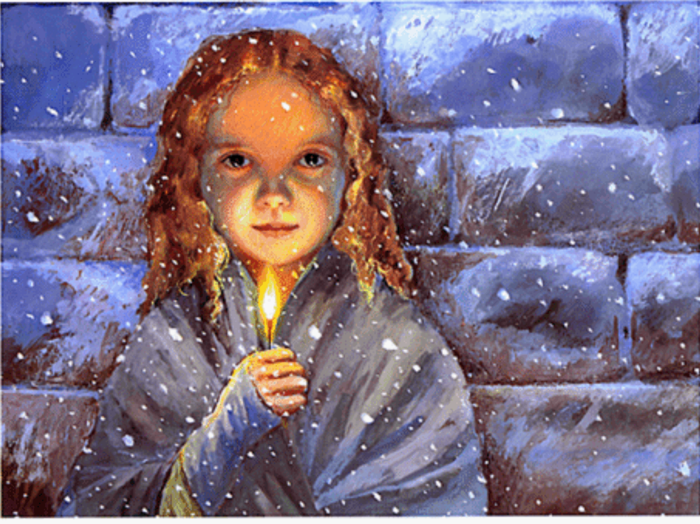
IT WAS TO TERRIBLY COLD. Snow was falling, and it was almost dark. Evening came on, the last evening of the year. In the cold and gloom a poor little girl, bareheaded and barefoot, was walking through the streets. Of course when she had left her house she'd had slippers on, but what good had they been? They were very big slippers, way too big for her, for they belonged to her mother. The little girl had lost them running across the road, where two carriages had rattled by terribly fast. One slipper she'd not been able to find again, and a boy had run off with the other, saying he could use it very well as a cradle some day when he had children of his own. And so the little girl walked on her naked feet, which were quite red and blue with the cold. In an old apron she carried several packages of matches, and she held a box of them in her hand. No one had bought any from her all day long, and no one had given her a cent.
Shivering with cold and hunger, she crept along, a picture of misery, poor little girl! The snowflakes fell on her long fair hair, which hung in pretty curls over her neck. In all the windows lights were shining, and there was a wonderful smell of roast goose, for it was New Year's eve. Yes, she thought of that!
In a corner formed by two houses, one of which projected farther out into the street than the other, she sat down and drew up her little feet under her. She was getting colder and colder, but did not dare to go home, for she had sold no matches, nor earned a single cent, and her father would surely beat her. Besides, it was cold at home, for they had nothing over them but a roof through which the wind whistled even though the biggest cracks had been stuffed with straw and rags.
Her hands were almost dead with cold. Oh, how much one little match might warm her! If she could only take one from the box and rub it against the wall and warm her hands. She drew one out. R-r-ratch! How it sputtered and burned! It made a warm, bright flame, like a little candle, as she held her hands over it; but it gave a strange light! It really seemed to the little girl as if she were sitting before a great iron stove with shining brass knobs and a brass cover. How wonderfully the fire burned! How comfortable it was! The youngster stretched out her feet to warm them too; then the little flame went out, the stove vanished, and she had only the remains of the burnt match in her hand.
She struck another match against the wall. It burned brightly, and when the light fell upon the wall it became transparent like a thin veil, and she could see through it into a room. On the table a snow-white cloth was spread, and on it stood a shining dinner service. The roast goose steamed gloriously, stuffed with apples and prunes. And what was still better, the goose jumped down from the dish and waddled along the floor with a knife and fork in its breast, right over to the little girl. Then the match went out, and she could see only the thick, cold wall. She lighted another match. Then she was sitting under the most beautiful Christmas tree. It was much larger and much more beautiful than the one she had seen last Christmas through the glass door at the rich merchant's home. Thousands of candles burned on the green branches, and colored pictures like those in the printshops looked down at her. The little girl reached both her hands toward them. Then the match went out. But the Christmas lights mounted higher. She saw them now as bright stars in the sky. One of them fell down, forming a long line of fire.
"Now someone is dying," thought the little girl, for her old grandmother, the only person who had loved her, and who was now dead, had told her that when a star fell down a soul went up to God.
She rubbed another match against the wall. It became bright again, and in the glow the old grandmother stood clear and shining, kind and lovely.
"Grandmother!" cried the child. "Oh, take me with you! I know you will disappear when the match is burned out. You will vanish like the warm stove, the wonderful roast goose and the beautiful big Christmas tree!"
And she quickly struck the whole bundle of matches, for she wished to keep her grandmother with her. And the matches burned with such a glow that it became brighter than daylight. Grandmother had never been so grand and beautiful. She took the little girl in her arms, and both of them flew in brightness and joy above the earth, very, very high, and up there was neither cold, nor hunger, nor fear-they were with God.
But in the corner, leaning against the wall, sat the little girl with red cheeks and smiling mouth, frozen to death on the last evening of the old year. The New Year's sun rose upon a little pathetic figure. The child sat there, stiff and cold, holding the matches, of which one bundle was almost burned.
"She wanted to warm herself," the people said. No one imagined what beautiful things she had seen, and how happily she had gone with her old grandmother into the bright New Year.
| Return to Index |
The Tailor of Gloucester (1903)
by Beatrix Potter
MY DEAR FREDA:
Because you are fond of fairy tales, and have been ill, I have made you a story all for yourself—a new one that nobody has read before.
And the queerest thing about it is—that I heard it in Gloucestershire, and that it is true—at least about the tailor, the waistcoat, and the "No more twist!" Christmas.
THE TAILOR OF GLOUCESTER
IN the time of swords and periwigs and full-skirted coats with flowered lappets—when gentlemen wore ruffles, and gold-laced waistcoats of paduasoy and taffeta—there lived a tailor in Gloucester.
He sat in the window of a little shop in Westgate Street, cross-legged on a table from morning till dark.
All day long while the light lasted he sewed and snippetted, piecing out his satin, and pompadour, and lutestring; stuffs had strange names, and were very expensive in the days of the Tailor of Gloucester.
But although he sewed fine silk for his neighbours, he himself was very, very poor—a little old man in spectacles, with a pinched face, old crooked fingers, and a suit of threadbare clothes.
He cut his coats without waste; according to his embroidered cloth, they were very small ends and snippets that lay about upon the table—"Too narrow breadths for nought—except waistcoats for mice," said the tailor.
One bitter cold day near Christmas-time the tailor began to make a coat (a coat of cherry-coloured corded silk embroidered with pansies and roses) and a cream-coloured satin waistcoat (trimmed with gauze and green worsted chenille) for the Mayor of Gloucester.
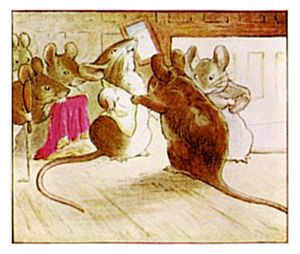 |
 |
The tailor worked and worked, and he talked to himself. He measured the silk, and turned it round and round, and trimmed it into shape with his shears; the table was all littered with cherry-coloured snippets.
"No breadth at all, and cut on the cross; it is no breadth at all; tippets for mice and ribbons for mobs! for mice!" said the Tailor of Gloucester.
When the snow-flakes came down against the small leaded window-panes and shut out the light, the tailor had done his day's work; all the silk and satin lay cut out upon the table.
There were twelve pieces for the coat and four pieces for the waistcoat; and there were pocket-flaps and cuffs and buttons, all in order. For the lining of the coat there was fine yellow taffeta, and for the buttonholes of the waistcoat there was cherry-coloured twist. And everything was ready to sew together in the morning, all measured and sufficient—except that there was wanting just one single skein of cherry-coloured twisted silk.
The tailor came out of his shop at dark, for he did not sleep there at nights; he fastened the window and locked the door, and took away the key. No one lived there at nights but little brown mice, and they ran in and out without any keys!
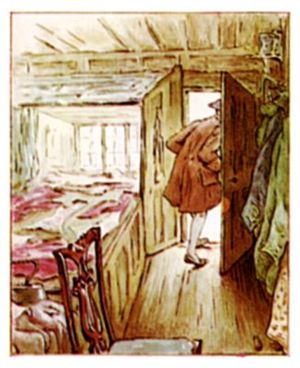 |
 |
For behind the wooden wainscots of all the old houses in Gloucester, there are little mouse staircases and secret trap-doors; and the mice run from house to house through those long, narrow passages; they can run all over the town without going into the streets.
But the tailor came out of his shop and shuffled home through the snow; he lived quite near by in College Court, next the doorway to College Green. And although it was not a big house, the tailor was so poor he only rented the kitchen.
He lived alone with his cat; it was called Simpkin.
Now all day long while the tailor was out at work, Simpkin kept house by himself; and he also was fond of the mice, though he gave them no satin for coats!
"Miaw?" said the cat when the tailor opened the door, "miaw?"
The tailor replied: "Simpkin, we shall make our fortune, but I am worn to a ravelling. Take this groat (which is our last fourpence), and, Simpkin, take a china pipkin, buy a penn'orth of bread, a penn'orth of milk, and a penn'orth of sausages. And oh, Simpkin, with the last penny of our fourpence buy me one penn'orth of cherry-coloured silk. But do not lose the last penny of the fourpence, Simpkin, or I am undone and worn to a thread-paper, for I have no more twist."
 |
 |
Then Simpkin again said "Miaw!" and took the groat and the pipkin, and went out into the dark.
The tailor was very tired and beginning to be ill. He sat down by the hearth and talked to himself about that wonderful coat.
"I shall make my fortune—to be cut bias—the Mayor of Gloucester is to be married on Christmas Day in the morning, and he hath ordered a coat and an embroidered waistcoat—to be lined with yellow taffeta—and the taffeta sufficeth; there is no more left over in snippets than will serve to make tippets for mice——"
Then the tailor started; for suddenly, interrupting him, from the dresser at the other side of the kitchen came a number of little noises—
Tip tap, tip tap, tip tap tip!
"Now what can that be?" said the Tailor of Gloucester, jumping up from his chair. The dresser was covered with crockery and pipkins, willow pattern plates, and tea-cups and mugs.
The tailor crossed the kitchen, and stood quite still beside the dresser, listening, and peering through his spectacles. Again from under a teacup came those funny little noises—
Tip tap, tip tap, tip tap tip!
"This is very peculiar," said the Tailor of Gloucester, and he lifted up the tea-cup which was upside down.
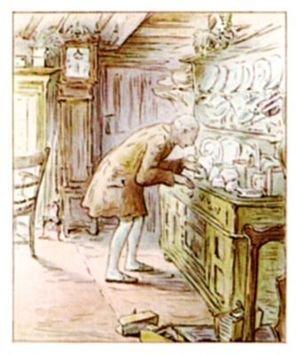 |
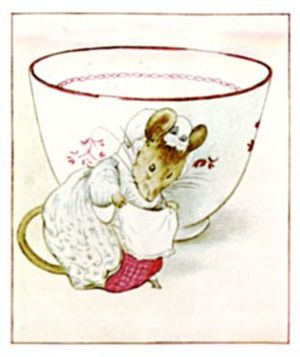 |
Out stepped a little live lady mouse, and made a courtesy to the tailor! Then she hopped away down off the dresser, and under the wainscot.
The tailor sat down again by the fire, warming his poor cold hands, and mumbling to himself:—
"The waistcoat is cut out from peach-coloured satin—tambour stitch and rose-buds in beautiful floss silk! Was I wise to entrust my last fourpence to Simpkin? One-and-twenty buttonholes of cherry-coloured twist!"
But all at once, from the dresser, there came other little noises—
Tip tap, tip tap, tip tap tip!
"This is passing extraordinary!" aid the Tailor of Gloucester, and turned over another tea-cup, which was upside down.
Out stepped a little gentleman mouse, and made a bow to the tailor!
And then from all over the dresser came a chorus of little tappings, all sounding together, and answering one another, like watch-beetles in an old worm-eaten window-shutter—
Tip tap, tip tap, tip tap tip!
And out from under tea-cups and from under bowls and basins, stepped other and more little mice, who hopped away down off the dresser and under the wainscot.
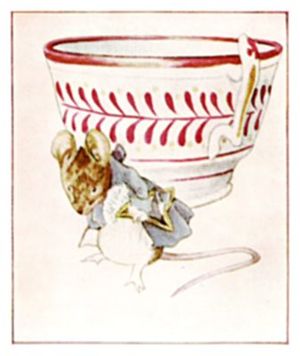 |
 |
The tailor sat down, close over the fire, lamenting: "One-and-twenty buttonholes of cherry-coloured silk! To be finished by noon of Saturday: and this is Tuesday evening. Was it right to let loose those mice, undoubtedly the property of Simpkin? Alack, I am undone, for I have no more twist!"
The little mice came out again and listened to the tailor; they took notice of the pattern of that wonderful coat. They whispered to one another about the taffeta lining and about little mouse tippets.
And then suddenly they all ran away together down the passage behind the wainscot, squeaking and calling to one another as they ran from house to house; and not one mouse was left in the tailor's kitchen when Simpkin came back with the pipkin of milk!
Simpkin opened the door and bounced in, with an angry "G-r-r-miaw!" like a cat that is vexed; for he hated the snow, and there was snow in his ears, and snow in his collar at the back of his neck. He put down the loaf and the sausages upon the dresser, and sniffed.
"Simpkin," said the tailor, "where is my twist?"
But Simpkin set down the pipkin of milk upon the dresser, and looked suspiciously at the tea-cups. He wanted his supper of little fat mouse!
"Simpkin," said the tailor, "where is my twist?"
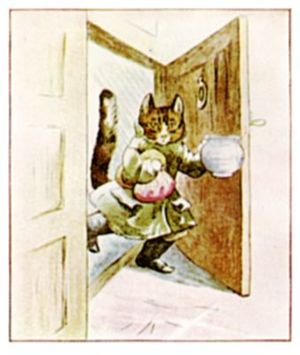 |
 |
But Simpkin hid a little parcel privately in the tea-pot, and spit and growled at the tailor; and if Simpkin had been able to talk, he would have asked: "Where is my Mouse?"
"Alack, I am undone!" said the Tailor of Gloucester, and went sadly to bed.
All that night long Simpkin hunted and searched through the kitchen, peeping into cupboards and under the wainscot, and into the tea-pot where he had hidden that twist; but still he found never a mouse!
And whenever the tailor muttered and talked in his sleep, Simpkin said: "Miaw-ger-r-w-s-s-ch!" and made strange, horrid noises, as cats do at night.
For the poor old tailor was very ill with a fever, tossing and turning in his four-post bed; and still in his dreams he mumbled: "No more twist! no more twist!"
All that day he was ill, and the next day, and the next; and what should become of the cherry-coloured coat? In the tailor's shop in Westgate Street the embroidered silk and satin lay cut out upon the table—one-and-twenty buttonholes—and who should come to sew them, when the window was barred, and the door was fast locked?
But that does not hinder the little brown mice; they run in and out without any keys through all the old houses in Gloucester!
 |
 |
Out-of-doors the market folks went trudging through the snow to buy their geese and turkeys, and to bake their Christmas pies; but there would be no Christmas dinner for Simpkin and the poor old tailor of Gloucester.
The tailor lay ill for three days and nights; and then it was Christmas Eve, and very late at night. The moon climbed up over the roofs and chimneys, and looked down over the gateway into College Court. There were no lights in the windows, nor any sound in the houses; all the city of Gloucester was fast asleep under the snow.
And still Simpkin wanted his mice, and mewed as he stood beside the four-post bed.
But it is in the old story that all the beasts can talk in the night between Christmas Eve and Christmas Day in the morning (though there are very few folk that can hear them, or know what it is that they say).
When the Cathedral clock struck twelve there was an answer—like an echo of the chimes—and Simpkin heard it, and came out of the tailor's door, and wandered about in the snow.
From all the roofs and gables and old wooden houses in Gloucester came a thousand merry voices singing the old Christmas rhymes—all the old songs that ever I heard of, and some that I don't know, like Whittington's bells.
 |
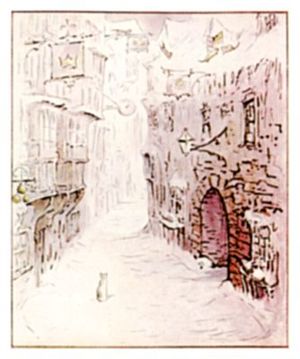 |
First and loudest the cocks cried out: "Dame, get up, and bake your pies!"
"Oh, dilly, dilly, dilly!" sighed Simpkin.
And now in a garret there were lights and sounds of dancing, and cats came from over the way.
"Hey, diddle, diddle, the cat and the fiddle! All the cats in Gloucester—except me," said Simpkin,
Under the wooden eaves the starlings and sparrows sang of Christmas pies; the jackdaws woke up in the Cathedral tower; and although it was the middle of the night the throstles and robins sang; the air was quite full of little twittering tunes.
But it was all rather provoking to poor hungry Simpkin.
Particularly he was vexed with some little shrill voices from behind a wooden lattice. I think that they were bats, because they always have very small voices—especially in a black frost, when they talk in their sleep, like the Tailor of Gloucester.
They said something mysterious that sounded like—
"Buzz, quoth the blue fly; hum, quoth the bee;
Buzz and hum they cry, and so do we!"
and Simpkin went away shaking his ears as if he had a bee in his bonnet.
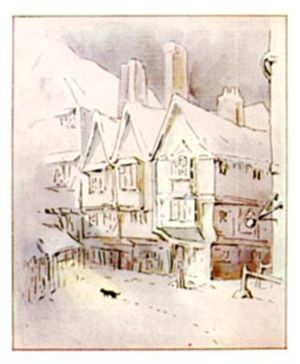 |
 |
From the tailor's shop in Westgate came a glow of light; and when Simpkin crept up to peep in at the window it was full of candles. There was a snippeting of scissors, and snappeting of thread; and little mouse voices sang loudly and gaily:
"Four-and-twenty tailors
Went to catch a snail,
The best man amongst them
Durst not touch her tail;
She put out her horns
Like a little kyloe cow.
Run, tailors, run! or she'll have you all e'en now!"
Then without a pause the little mouse voices went on again:
"Sieve my lady's oatmeal,
Grind my lady's flour,
Put it in a chestnut,
Let it stand an hour——"
"Mew! Mew!" interrupted Simpkin, and he scratched at the door. But the key was under the tailor's pillow; he could not get in.
The little mice only laughed, and tried another tune—
"Three little mice sat down to spin,
Pussy passed by and she peeped in.
What are you at, my fine little men?
Making coats for gentlemen.
Shall I come in and cut off your threads?
Oh, no, Miss Pussy, you'd bite off our heads!"
"Mew! Mew!" cried Simpkin.
"Hey diddle dinketty!" answered the little mice—
"Hey diddle dinketty, poppetty pet!
The merchants of London they wear scarlet;
Silk in the collar, and gold in the hem,
So merrily march the merchantmen!"
They clicked their thimbles to mark the time, but none of the songs pleased Simpkin; he sniffed and mewed at the door of the shop.
 |
 |
"And then I bought
A pipkin and a popkin,
A slipkin and a slopkin,
All for one farthing——
and upon the kitchen dresser!" added the rude little mice.
"Mew! scratch! scratch!" scuffled Simpkin on the window-sill; while the little mice inside sprang to their feet, and all began to shout at once in little twittering voices: "No more twist! No more twist!" And they barred up the window-shutters and shut out Simpkin.
But still through the nicks in the shutters he could hear the click of thimbles, and little mouse voices singing:
"No more twist! No more twist!"
Simpkin came away from the shop and went home considering in his mind. He found the poor old tailor without fever, sleeping peacefully.
Then Simpkin went on tip-toe and took a little parcel of silk out of the tea-pot; and looked at it in the moonlight; and he felt quite ashamed of his badness compared with those good little mice!
When the tailor awoke in the morning, the first thing which he saw, upon the patchwork quilt, was a skein of cherry-coloured twisted silk, and beside his bed stood the repentant Simpkin!
 |
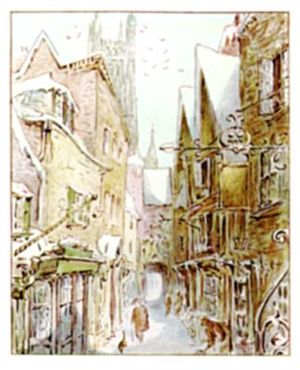 |
"Alack, I am worn to a ravelling," said the tailor of Gloucester, "but I have my twist!"
The sun was shining on the snow when the tailor got up and dressed, and came out into the street with Simpkin running before him.
The starlings whistled on the chimney stacks, and the throstles and robins sang—but they sang their own little noises, not the words they had sung in the night.
"Alack," said the tailor, "I have my twist; but no more strength—nor time—than will serve to make me one single buttonhole; for this is Christmas Day in the Morning! The Mayor of Gloucester shall be married by noon —and where is his cherry-coloured coat?"
He unlocked the door of the little shop in Westgate Street, and Simpkin ran in, like a cat that expects something.
But there was no one there! Not even one little brown mouse!
The boards were swept and clean; the little ends of thread and the little silk snippets were all tidied away, and gone from off the floor.
But upon the table—oh joy! the tailor gave a shout—there, where he had left plain cuttings of silk there lay the most beautifullest coat and embroidered satin waistcoat that ever were worn by a Mayor of Gloucester!
There were roses and pansies upon the facings of the coat; and the waistcoat was worked with poppies and corn-flowers.
Everything was finished except just one single cherry-coloured buttonhole, and where that buttonhole was wanting there was pinned a scrap of paper with these words—in little teeny weeny writing—
NO MORE TWIST.
And from then began the luck of the Tailor of Gloucester; he grew quite stout, and he grew quite rich.
He made the most wonderful waistcoats for all the rich merchants of Gloucester, and for all the fine gentlemen of the country round.
 |
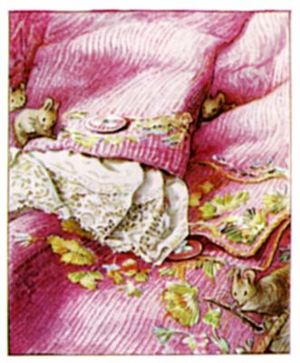 |
Never were seen such ruffles, or such embroidered cuffs and lappets! But his buttonholes were the greatest triumph of it all.
The stitches of those buttonholes were so neat—so neat—I wonder how they could be stitched by an old man in spectacles, with crooked old fingers, and a tailor's thimble.
The stitches of those buttonholes were so small—so small—they looked as if they had been made by little mice!
THE END
| Return to Index |
How the Grinch Stole Christmas
At the ripe old age of 17, which most of us were, this book was published.
How the Grinch Stole Christmas! is a children's story by Theodor 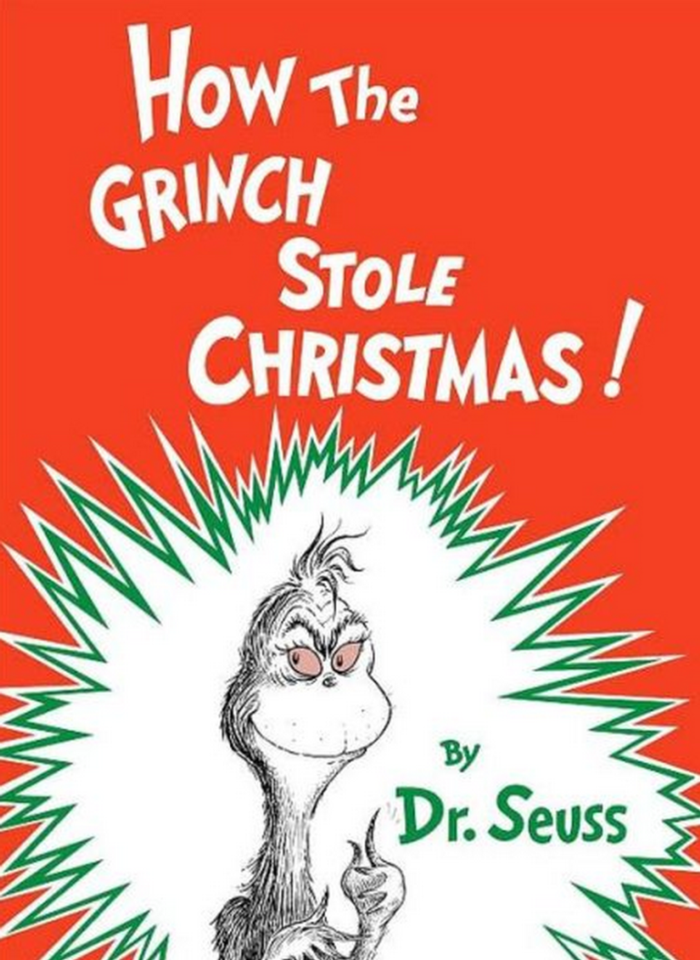 “Dr. Seuss” written in rhymed verse with illustrations by the author. It follows the Grinch, a grouchy, solitary creature who attempts to put an end to Christmas by stealing Christmas-themed items from the homes of the nearby town Whoville on Christmas Eve. Despite his efforts, Whoville's inhabitants still celebrate the holiday, so the Grinch learns that Christmas is more than the items he's stolen and ends up returning everything that he stole and is the guest of honor at the Whos' Christmas dinner.
“Dr. Seuss” written in rhymed verse with illustrations by the author. It follows the Grinch, a grouchy, solitary creature who attempts to put an end to Christmas by stealing Christmas-themed items from the homes of the nearby town Whoville on Christmas Eve. Despite his efforts, Whoville's inhabitants still celebrate the holiday, so the Grinch learns that Christmas is more than the items he's stolen and ends up returning everything that he stole and is the guest of honor at the Whos' Christmas dinner.
The story was published as a book by Random House in 1957, and at approximately the same time in an issue of Redbook The book criticizes the commercialization of Christmas. Based on a 2007 online poll, the National Education Association named it one of its "Teachers' Top 100 Books for Children". In 2012 it was ranked number 61 among the "Top 100 Picture Books" in a survey published by School Library Journal – the fourth of five Dr. Seuss books on the list.
The book was adapted as a Christmas special twice, a 1966 animated TV film starring Boris Karloff as both the narrator and the voice of the Grinch and a 2000 live-action feature film starring Jim Carrey. There will also be a computer animated film adaptation, starring Benedict Cumberbatch scheduled for release on November 9, 2018.
The Grinch first appeared in a 32-line illustrated poem by Dr. Seuss called "The Hoobub and the Grinch," which was originally published in the May 1955 edition of Redbook magazine. Dr. Seuss began work on How the Grinch Stole Christmas! a couple years later, around the beginning of 1957. He had recently completed The Cat in the Hat and was in the midst of founding Beginner Books with Phyllis and Bennett Cerf and his wife, Helen Palmer Geisel. Helen, who had ongoing medical problems and had suffered a small stroke in April 1957, nevertheless acted as an unofficial editor, as she had with previous Dr. Seuss books. Dr. Seuss wrote the book quickly and was mostly finished with it within a few weeks.Biographers Judith and Neil Morgan wrote, "It was the easiest book of his career to write, except for its conclusion."] According to Dr. Seuss,
"I got hung up getting the Grinch out of the mess. I got into a situation where I sounded like a second-rate preacher or some biblical truisim... Finally in desperation... without making any statement whatever, I showed the Grinch and the Whos together at the table, and made a pun of the Grinch carving the 'roast beast.' ... I had gone through thousands of religious choices, and then after three months it came out like that."
By mid-May 1957, the book was finished and in the mail to the Radom House offices in New York. In June, the Dr. Seuss and his wife took a month-long vacation to Hawaii, where he checked and returned the book's galley proof. The book debuted in December 1957, in both a book version published by Random House and in an issue of Redbook Dr. Seuss dedicated the book to Theodor "Teddy" Owens, the one-year-old son of his niece, Peggy Owens.
| Return to Index |
Dicken's Christmas Carol in Verse
We lived on Prairie Avenue -- down the hill -- during my elementary school years and had a neighbor at the other end of the block who was Roseland's Resident Poetess. Her name was Hilda Butler Farr, and her mom lived in our apartment building. I remember reading just one of Ms Farr's pieces as a kid, thought it was clever, and have looked for a copy of it for many years. Last winter I finally found the poem I was searching for in a 1958 copy of The Louis Allis Messenger printed by The Louis Allis Company of Milwaukee, Wisconsin. I still like it and thought I'd share it with the rest of you.
|
|
Dicken's Christmas Carol in Verse Once upon a Christmas-eve day Suddenly a voice was saying, "Well, then,” cried the nephew gaily, “Christmastime is kind, forgiving . . . “Come and dine with us tomorrow At last arrived the time for closing You’ll want all day, tomorrow. Will you?” Scrooge ate his melancholy dinner He placed his key within the doorlatch With trembling hand he turned the key He settled down before the fire He saw it slowly start to move . . . A ghastly phantom crept along “What do you want?” asked Mr. Scrooge. "It’s humbug, humbug!” muttered Scrooge. “Do you believe in me . . . or not?” “Well listen closely now to me— “But, if he fails throughout his life, “I wear the chain I forged in life “You have a chance to yet escape "The first will come to visit you “I am the Ghost of Christmas Before Scrooge hardly knew it Back to the little schoolhouse While peering through the window Enjoying a merry party And Scrooge’s heart was weeping The spirit took him further Said Scrtooge, “The burden’s heavy “I am the Ghost of Christmas Present,” And so they went to find Bob Cratchit, And how delighted was this family And after dinnertime was over, Devoutly then the children echoed He was the youngest child, a cripple, In humbleness he asked the spirit And then the spirit whirled him onward So many other homes and places "Are you the Christmas yet to come?" Still silently it pointed straight . . . The spirit's mission soon began It showed him Tiny Tim might die They found a poor neglected grave . . . He begged for mercy . . . begged his guide "The Past, the Present, Future too, He fell upon his knees in prayer, "Oh, thank you, Jacob Marley, "I don't know what I'm doing." "What day is this, I wonder? And then the bells were ringing He opened up the window "I'll buy the bgiggest turkey, So then he went out walking, He went to church and worshipped He visited his nephew Next morning at the office He started then to scold him, To Bob it was confusing, He was a second father He kept the Christmas spirit
|
| Return to Index |
WRITTEN IN 1816 BY GERMAN AUTHOR E.T.A. HOFFMANN, tells of a young Marie Stahlbaum's favorite Christmas toy, the Nutcracker, coming alive and whisking Marie away to a magical kingdom populated by dolls. In 1892, the Russian composer Pyotr Ilyiich Tchaikovsky and choreographers Marius Petipa and Lev Ivanov turned Alexandre Dumas's adaptation of the story into the ballet The Nutcracker. 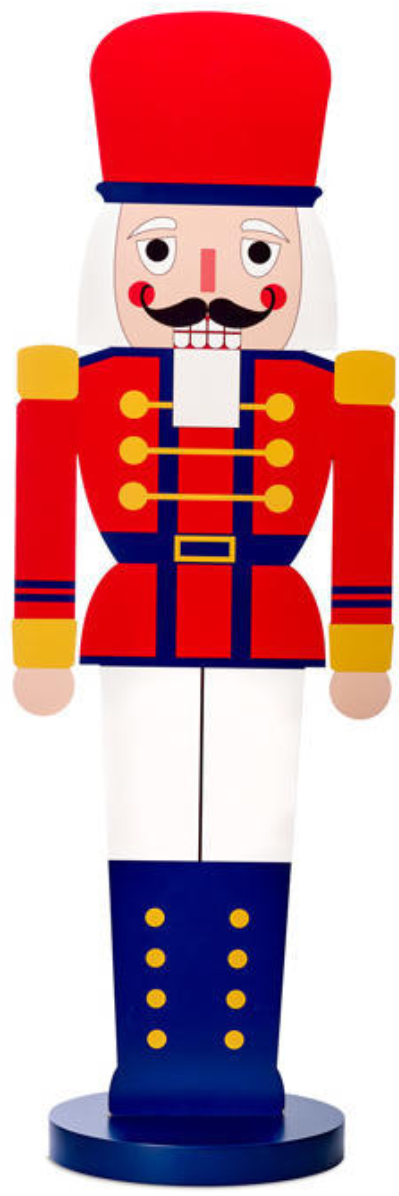
The wondrous tale of the Nutcracker begins on Christmas Eve at the Stahlbaum house. Marie, seven, and her brother, Fritz, eight, sit outside the grand parlor speculating about what kind of present their Grandfather Drosselmeyer, who is a clockmaker and inventor, has made for them. At last the children are allowed into the main room. The huge Christmas tree is ablaze with lights and they receive many splendid gifts including a beautiful a clockwork castle with mechanical people moving about inside it. However, as the clock can only do the same thing over and over without variation, the children quickly tire of it.
At this point, Marie notices a nutcracker alone in the corner of the room and asks to whom he belongs. Her father tells her that he belongs to all of them; but that since she is so fond of him, she will be his special caretaker. Marie, Fritz, and their sister Louise, pass the prized nutcracker among them to crack nuts until Fritz tries to crack one that is too big and too hard. The nutcracker's jaw breaks, and Marie is very upset. She takes him away and bandages him with a ribbon from her dress.
When it is time for bed, the children put their Christmas gifts away in the special cabinet where they keep their toys. Fritz and Louise go up to bed, but Marie begs to be allowed to stay with the nutcracker a while longer and is allowed to do so. She puts him to bed and tells him that Drosselmeyer will fix his jaw as good as new. At this, his face seems momentarily to come alive, and Marie is frightened. She finally decides it was only her imagination.
The grandfather clock begins to chime, and Marie believes she sees Drosselmeyer sitting on top of it and preventing it from striking. Mice begin to come out from beneath the floor boards, among them the seven-headed Mouse King. The dolls in the toy cabinet come alive and the nutcracker jumps to life, takes command, and leads the dolls into battle after putting Marie's ribbon on as a token. The mice attack and eventually overwhelm the dolls. Marie, seeing the nutcracker about to be taken prisoner, takes off her slipper, throws it at the Mouse King, and faints. She falls into the toy cabinet's glass door and cuts her arm badly.
Marie wakes up in her bed the next morning with her arm bandaged and tries to tell her parents about the battle between the mice and the dolls. They do not believe her and think that she has had a fever dream caused by the wound she sustained from the broken glass.
Several days later, Drosselmeyer arrives with the nutcracker whose jaw is as good as new and tells Marie the following story of Princess Pirlipat and the Queen of the Mice, Madam Mouserinks. His story explains how nutcrackers came to be and why they look the way they do:
The Mouse Queen had tricked Pirlipat's mother into allowing her and her children to gobble up the lard that was supposed to go into the sausage that the King was to eat at dinner that evening. The King, enraged at the Mouse Queen for spoiling his supper, had his court inventor -- whose name happens to be Drosselmeyer -- create traps for the Mouse Queen and her children. All the children were caught and killed.
The Mouse Queen, angered at the death of her children, swore that she would take revenge on Pirlipat. Her mother surrounded Pirlipat with cats, which were supposed to be kept awake by being constantly stroked. Inevitably, the nurses who were to do so fell asleep; and the Mouse Queen magically turned Pirlipat ugly by giving her a huge head, a wide grinning mouth, and a cottony beard. The King blamed Drosselmeyer and gave him four weeks to find a cure. He found no cure and consulted his friend the court astrologer.
Together they read Pirlipat's horoscope and then told the King that the only way to cure her was to have her eat the nut Crackatook, which must be cracked and handed to her by a man who had never been shaved nor worn boots since birth. He must, without opening his eyes, hand her the kernel and take seven steps backwards without stumbling. The King sent Drosselmeyer and the astrologer to look for that man and charged them on pain of death not to return until they found him and the required nut, Crackatook.
The two men journeyed for many years without finding either the nut or the man. When they returned home to Nuremberg, they found the nut in the possession of Drosselmeyer's cousin, a puppet-maker. His son turned out to be the young man needed to crack the nut.
The King, once the nut had been found, promised Pirlipat's hand to whoever could crack it. Many men broke their teeth on it before Drosselmeyer's nephew finally appeared. He cracked it easily and handed it to Pirlipat, who swallowed it and immediately became beautiful again, but Drosselmeyer's nephew, on his seventh backward step, stepped on the Mouse Queen and stumbled, and the curse fell on him. He grew a large head, a wide grinning mouth, and a cottony beard; in short, it made him a nutcracker. The ungrateful and unsympathetic Pirlipat, seeing how ugly he had become, refused to marry him and banished him from the castle.
Marie, while she is recuperating from her wound, hears the Mouse King, son of the now deceased Madam Mouserinks, whispering to her in the middle of the night. He threatens to bite the nutcracker to pieces unless she gives him her sweets and dolls. For the nutcracker's sake, she sacrifices them. He demands more and more of her treasures until the nutcracker tells her to get him a sword and he will finish off the Mouse King. She asks Fritz for one, and he obliges.
The next night, the nutcracker comes into Marie's room bearing the Mouse King's seven crowns and takes her with him to the doll kingdom, where she sees many wonderful things. She eventually falls asleep in the nutcracker's palace and is brought back home. She tries to tell her mother what has happened, but again she is not believed even though she shows her parents the seven crowns. Instead, Marie is forbidden to speak of her "dreams" anymore.
One day Marie is sitting in front of the toy cabinet while Drosselmeyer is repairing one of her father's clocks. She looks at the nutcracker and thinks about all the wondrous things that had happened and can't keep silent anymore. She swears to him that if he were ever really real she would never behave as Pirlipat did and would love him always no matter what he looked like. At this, there is a bang and she faints and falls off the chair. Her mother comes in to tell her that Drosselmeyer's nephew has arrived from Nuremberg. The nephew takes her aside and tells her that by swearing that she would love him in spite of his looks, she broke the curse on him and made him human again. He asks her to marry him. She accepts, and in a year and a day he comes for her and takes her away to the doll kingdom where she marries him and is crowned queen.
Dance of the Flowers
| Return to Index |
Letter from Santa to Susy Clemens
Samuel Langhorne Clemens (November 30, 1835 – April 21, 1910), well known by his pen name Mark Twain, was an American author and humorist. Twain is noted for his novels Adventures of Huckleberry Finn, which has been called “the Great American Novel”, and The Adventures of Tom Sawyer. Twain was a friend to presidents, artists, industrialists, and European royalty. His elder daughter, Susy Clemens, was born in Elmira, New York, and lived a short life, dying at the age of 23 from meningitis. In childhood, Susy often had poor health, similar to her mother. At 13, she wrote a biography of her father, which was included as part of Twain’s Chapters From My Autobiography. Mark Twain wrote a letter to his daughter, which he sent from Santa Claus, during one of her childhood illnesses.
|
| Return to Index |
Twas the Night Before Christmas
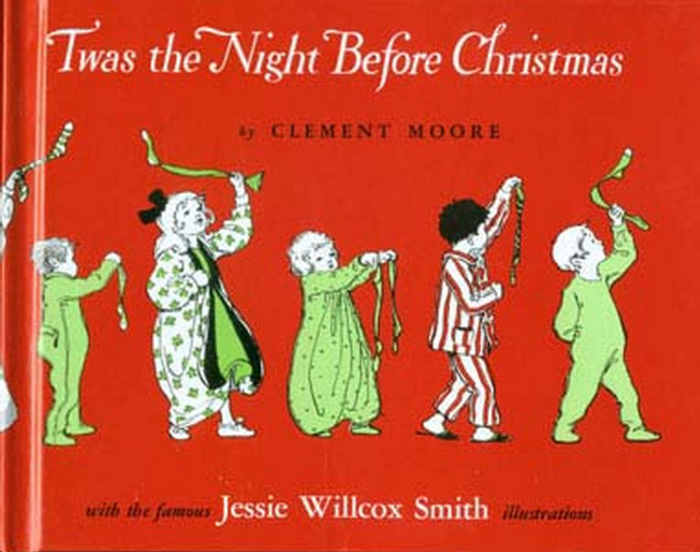 ONE OF THE OLDEST AND MOST POPULAR CHRISTMAS POEMS, COMMONLY REFERRED TO AS “Twas The Night Before Christmas,” was written in the early 19th century. Its popularity is measured by the millions of times it's been read to excited children just before they close their eyes on Christmas Eve -- as it was in my house and probably in yours too. One hundred and eighty-plus years later, it is the most-published, most-read, most-memorized, and most-collected book in all of Christmas literature.
ONE OF THE OLDEST AND MOST POPULAR CHRISTMAS POEMS, COMMONLY REFERRED TO AS “Twas The Night Before Christmas,” was written in the early 19th century. Its popularity is measured by the millions of times it's been read to excited children just before they close their eyes on Christmas Eve -- as it was in my house and probably in yours too. One hundred and eighty-plus years later, it is the most-published, most-read, most-memorized, and most-collected book in all of Christmas literature.
Though its author is disputed, with the poem being attributed to both Clement Clarke Moore and Henry Livingston Jr. over the years, it was definitely first published on Dec. 23, 1823 in the Troy Sentinel newspaper in upstate New York and is largely responsible for some of the conceptions we hold today of Santa Claus.
It is also referred to as “A Visit From St. Nicholas” or “The Night Before Christmas,” and has been set to music and recorded by many artists. It has also been referred to in countless films and even has at least one film of its very own.
'TWAS THE NIGHT BEFORE CHRISTMAS, when all through the house
Not a creature was stirring, not even a mouse;
The stockings were hung by the chimney with care,
In hopes that St. Nicholas soon would be there;
The children were nestled all snug in their beds;
While visions of sugar-plums danced in their heads;
And mamma in her 'kerchief, and I in my cap,
Had just settled our brains for a long winter's nap,
When out on the lawn there arose such a clatter,
I sprang from my bed to see what was the matter.
Away to the window I flew like a flash,
Tore open the shutters and threw up the sash.
The moon on the breast of the new-fallen snow,
Gave a lustre of midday to objects below,
When what to my wondering eyes did appear,
But a miniature sleigh and eight tiny rein-deer,
With a little old driver so lively and quick,
I knew in a moment he must be St. Nick.
More rapid than eagles his coursers they came,
And he whistled, and shouted, and called them by name:
"Now, Dasher! now, Dancer! now Prancer and Vixen!
On, Comet! on, Cupid! on, Donner and Blitzen!
To the top of the porch! to the top of the wall!
Now dash away! dash away! dash away all!"
As leaves that before the wild hurricane fly,
When they meet with an obstacle, mount to the sky;
So up to the housetop the coursers they flew
With the sleigh full of toys, and St. Nicholas too—
And then, in a twinkling, I heard on the roof
The prancing and pawing of each little hoof.
As I drew in my head, and was turning around,
Down the chimney St. Nicholas came with a bound.
He was dressed all in fur, from his head to his foot,
And his clothes were all tarnished with ashes and soot;
A bundle of toys he had flung on his back,
And he looked like a pedler just opening his pack.
His eyes—how they twinkled! his dimples, how merry!
His cheeks were like roses, his nose like a cherry!
His droll little mouth was drawn up like a bow,
And the beard on his chin was as white as the snow;
The stump of a pipe he held tight in his teeth,
And the smoke, it encircled his head like a wreath;
He had a broad face and a little round belly
That shook when he laughed, like a bowl full of jelly.
He was chubby and plump, a right jolly old elf,
And I laughed when I saw him, in spite of myself;
A wink of his eye and a twist of his head
Soon gave me to know I had nothing to dread;
He spoke not a word, but went straight to his work,
And filled all the stockings; then turned with a jerk,
And laying his finger aside of his nose,
And giving a nod, up the chimney he rose;
He sprang to his sleigh, to his team gave a whistle,
And away they all flew like the down of a thistle.
But I heard him exclaim, ere he drove out of sight—
“Happy Christmas to all, and to all a good night!”
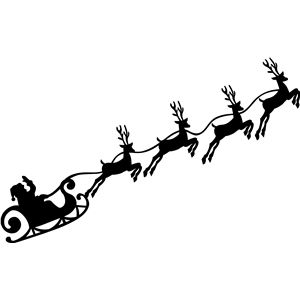
| Return to Index |
IN LATE 1930 TO MID-1940s, A NEW HOLIDAY TREND BEGAN AMONG THE LARGE DEPARTMENT STORES. Montgomery Ward’s introduced Rudolph the Red-Nosed Reindeer, and Wieboldt’s presented the Cinnamon Bear to the world. Not to be outdone, one of Marshall Field’s designers, Joanna Osborn, conjured Uncle Mistletoe –a plump, Dickens-like figure decked out in a red great-coat and black top hat. With white wings, he flew around the world teaching children to be kind and helped Santa by identifying all the good children.
In 1948, Uncle Mistletoe got some company in the form of Aunt Holly, and the pair became extremely popular and beloved symbols of Christmas at Marshall Field’s. They appeared in all of the store’s holiday windows, and Uncle Mistletoe was awarded the place of honor on the top of the huge Christmas tree in the Walnut Room restaurant. (In recent years if Uncle Mistletoe isn’t at the very top of the tree, a careful observer — an old-timer — can find him tucked somewhere among the lower boughs.) Shoppers, over the years, were able to buy dolls, books, ornaments, coloring sets, molded candles, cocktail napkins, hot pads, puppets, glassware, and many more items emblazoned with the pair’s likeness.
Marshall Field and Company created an entire cast of characters for Uncle Mistletoe who all lived with him in the Cozy Cloud cottage at Field’s. There was Aunt Holly, of course; Freddie Field Mouse and his family; Tony Pony; Otto the Elephant; elves Olio, Molio and Rolio; Aunt Judy; Skippy Monkey; Michael O’Hare; and Obediah Pig. From 1948 to 1952 Uncle Mistletoe and his friends starred three times a week in their own television show, “The Adventures of Uncle Mistletoe. They made numerous records, and even appeared in a Golden Book.
|
|
UNCLE MISTLETOE’S STORY Oh, the thingle, the jingle, the fun of tonight! ‘I wish we could stay up like ladies and men! ‘Well—jeepers!’ cried Jim-Jam; and ‘Joy!’ cried Jo-Ann,’ Oh, marvelous carpet, So fleet and so light! ‘Look down Jo,’ cried Jim-Jam; ‘I am,” said Jo-Ann, Far northward they see it, the beckoning beam Inside what a humming! What glitter and gleam! They walked through the castle more wonders to see, They met both the Clauses, And then at the last, ‘So now if you’ve finished your cake and ice cream, “They’re home in a flash; Uncle Mistletoe’s gone, “Oh, whooper-doo super-doo fun of today! So thanks, Uncle Mistletoe, you and your rug— |
Uncle Mistletoe
Owen Bradley and His Quintet
| Return to Index |
History’s Most Reprinted Newspaper Editorial: ‘Yes Virginia, There Is a Santa Claus’
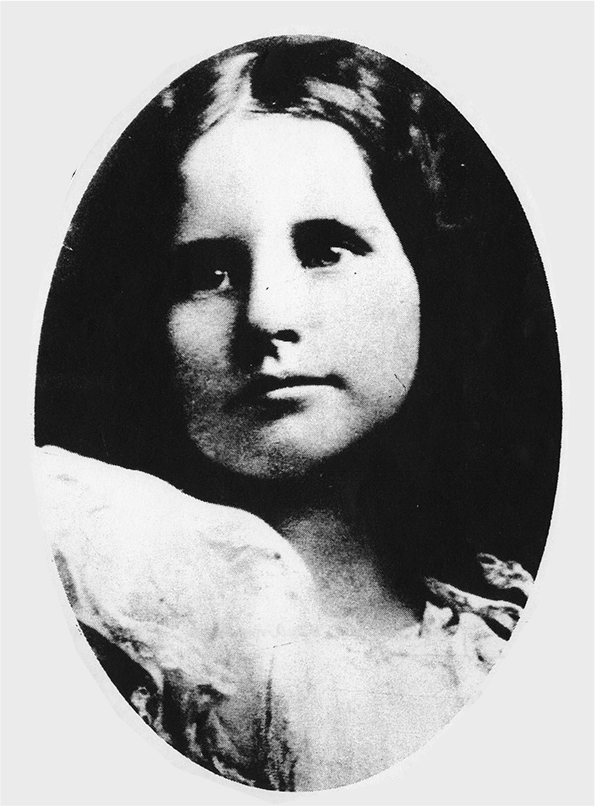 |
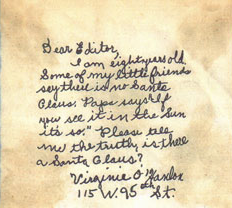 |
In 1897 DR. PHILIP O'HANLON, A NEW YORK CITY POLICE SURGEON AND DEPUTY CORONER ON MANHATTAN'S UPPER WEST SIDE, was asked by his then eight-year-old daughter, Virginia O'Hanlon, whether Santa Claus really existed. O'Hanlon suggested she write to The Sun, a prominent New York City newspaper at the time, and assured her that "If you see it in The Sun, it's so." As a result, Dr. O'Hanlon had unwittingly given the paper's veteran writer Francis Pharcellus Church, an opportunity to rise above the simple question and address the philosophical issues behind it.
Church, a hardened cynic and atheist, had been a war correspondent during the American Civil War—a time that saw great suffering and a corresponding lack of hope and faith in much of society. According to an anecdote on the radio program The Rest of the Story, Church had little patience for superstitious beliefs, did not want to write the editorial, and refused to allow his name to be attached to the piece.
Although the paper ran the editorial in the seventh place on the page—below even one on the newly invented chinless bicycle— it was both noticed and well received by readers. The anonymous editorial reply eventually became, and remains, a perennial favorite. Translated into dozens of languages (including Latin), Church’s testament to the spirit of Christmas and his celebration of the innocence of childhood and the power of faith has the distinction of being the most reprinted editorial in any newspaper in the English language.
|
The editorial continues to be deliberated since its publication. '' 'Yes, Virginia' is the ultimate feel-good editorial,'' said John Tebbel, a former chairman of the New York University journalism department.
William David Sloan, a journalism professor at the University of Arkansas, commented, ''Had he [Church] denied Santa Claus, he might have torn down the fanciful world of many youngsters and tampered with the values and traditions many people consider important. Had he affirmed Santa Claus matter-of-factly, he would have contributed no ideas of lasting significance. What Church did was sustain a child's hope while giving her a statement of ideals that are worthwhile for the adult. He did not simply continue a myth. He gave a reason for believing.''
The historian Stephen Nissenbaum thinks ''Yes, Virginia'' is concerned not so much with faith in Santa Claus as with faith in faith. ''The late 19th century was a period of vexing religious doubt for many middle-class Americans, and one characteristic solution was to think that God must exist simply because people so badly needed Him to.'' When Mr. Church referred "to the skepticism of a skeptical age," Mr. Nissenbaum said in an interview, he was speaking to grown-ups.
Could ''Yes, Virginia'' be written today? Yes, said Stephen Simurda, a journalism professor at the University of Massachusetts in Amherst, but ''whether anyone would notice it, sadly, I doubt it. Unless someone bought the rights and made a TV movie.''
Bob Haiman, president emeritus of the Poynter Institute for Media Studies in St. Petersburg, Fla., and the chairman of the 1997 Pulitzer Prize jury for editorial writing, said: ''Do you suppose there are any 8-year-olds left in America who still believe in Santa Claus? One can only hope. And after all, hope is what good editorial pages are all about.''
''Yes, Virginia'' has, of course, outlived its two principals (Mr. Church died in 1906, Virginia in 1971). Its influence, however, continues to be acknowledged over and over.
The story of Virginia's inquiry and The Sun's response was adapted in 1932 into an NBC produced cantata (the only known editorial set to classical music) and provided a segment of the short film Santa Claus Story in 1945.
- In 1971, four of Virginia's friends formed a company called Elizabeth Press and published a children's book titled Yes, Virginia that illustrated the editorial and included a brief history of the main characters. Its creators took it to Warner Brothers who eventually produced an Emmy award-winning television show aired in 1974.
- The last two paragraphs of Church's editorial are read by actor Sam Elliott in the 1989 film Prancer, about Jessica Riggs, a little girl who believes the wounded reindeer she is nursing back to health belongs to Santa. Jessica's story inspires the local newspaper editor, as Virginia's letter did to Church, to write an editorial which he titles Yes, Santa, there is a Virginia.
- In 1991 it was adapted into a made-for-TV movie starring Richard Thomas and Charles Bronson.
- In 1996 the story was adapted into an holiday musical by David Kirchenbaum (music and lyrics) and Myles McDonnel (book).
- On September 21, 1997, the 100th anniversary of the editorial's original publication, The New YorkTimes published an analysis of its enduring appeal.
- A copy of the letter, hand-written by Virginia and believed to be the original by her family was authenticated in 1998 by Kathleen Guzman, an appraiser on the television program Antiques Roadshow. In 2006 Virginia’s great-granddaughter brought the original letter back to the Antiques Roadshow, where it was appraised at a value of $20,000 - $30,000.
- In 2003 "Yes, Virginia, there is a Santa Claus" was depicted in a mechanical holiday window display at the Lord & Taylor department store on Fifth Avenue in Manhattan.
- In 2009, The Studio School in New York City, honored
Virginia'sVIRGINIA
LAURA VIRGINIA O'HANLON WAS BORN ON JULY 20, 1889 and was raised in New York City. Her brief marriage to Edward Douglas in the 1910s ended shortly before their daughter, Laura, was born.
Earning a doctorate from Fordham University, Virginia persued a career in education; and according to The New York Times, she eventually became the assistant principal of an independent Brooklyn school “with classes held in ten hospitals and other institutions for chronically ill children.” She retired in 1959.
Throughout her life, Virginia received inquiries from those curious about her childhood letter and Church’s reply. She credited the editorial with providing a positive direction to her life.
life and legacy. Janet C. Rotter, Head of School, announced the establishment of the Virginia O'Hanlon Scholarship, speaking passionately about their commitment to offering need-based scholarships for students of merit. Virginia's descendants continue her legacy.
- In December 2015, Macy's department store in Herald Square, New York City, NY used Virginia's story for their holiday window display. Illustrated in three-dimensional figurines and spanning several windows on the south side of the store along 34th Street between 6th and 7th Avenues. This version of "Yes, Virginia" is based on a 2010 television special of the same name, starring Neil Patrick Harris and
Bea Miller.
- Every year, Virginia's letter and Church's response are
read at the Yule Log ceremony at Church's alma mater, Columbia College of Columbia University. The Century
Club in Manhattan, of which Mr. Church was a member,
and the Gannett Newseum in Rosslyn, Virginia offer
retrospective displays at Christmastime.
Probably the biggest testament to the impact of Virginia’s inquiry and Church’s response is that "Yes, Virginia, there is (a) . . ." has become an accepted expression to insist that something is true.
Fall 2011 Troy Athens High School
Erin Williams, Alto; Tom Wdowik, Tenor. Directed by Mimi Gass. Accompanied by Min Chung.
| Return to Index |
Rudolph the Red-Nosed Reindeer
By Christopher Klein, December 19, 2014
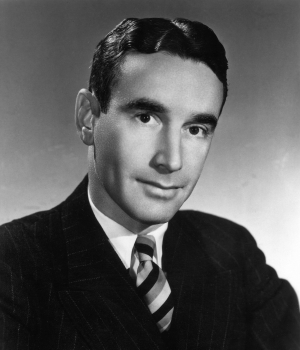
Although firmly entrenched as a Christmas icon, the tale of "Rudolph the Red-Nosed Reindeer" is a piece of relatively modern folklore penned in 1939 by a department store adman enduring a time of great personal tragedy. As Rudolph turns 75, learn the story behind the creation of the most famous reindeer of all.
BALSAM WREATHS AND VISIONS OF SUGARPLUMS HAD BARELY FADED IN THE FIRST WEEKS OF 1939, but thoughts inside the Chicago headquarters of retail giant Montgomery Ward had already turned to the next Christmas 11 months away. The retailer had traditionally purchased and distributed coloring books to children as a holiday promotion, but the advertising department decided it would be cheaper and more effective instead to develop its own Christmas-themed book in-house.
The assignment fell to Robert May, a copywriter with a knack for turning a limerick at the company’s holiday party. The adman, however, had difficulty summoning up holiday cheer, and not just because of the date on the calendar. Not only was the United States still trying to shake the decade-long Great Depression while the rumblings of war grew once again in Europe, but May’s wife was suffering with cancer and the medical bills had thrown the family into debt. Sure, he was pursuing his passion to write, but churning out mail order catalog copy about men’s shirts instead of penning the Great American Novel was not what he had envisioned himself doing at age 33 with a degree from Dartmouth College.
Given the assignment to develop an animal story, May thought a reindeer was a natural for the leading role (not to mention that his 4-year-old daughter, Barbara, loved the reindeers every time she visited the zoo). As he peered out at the thick fog that had drifted off Lake Michigan, May came up with the idea of a misfit reindeer ostracized because of his luminescent nose who used his physical abnormality to guide Santa’s sleigh and save Christmas. Seeking an alliterative name, May scribbled possibilities on a scrap of paper—Rollo, Reginald, Rodney and Romeo were among the choices—before circling his favorite. Rudolph.
As May worked on “Rudolph the Red-Nosed Reindeer” through the summer, his wife’s health worsened. She passed away in July 1939. Now a widower and a single father, May refused the offer of his boss to give the assignment to someone else. “I needed Rudolph now more than ever,” he later wrote. Burying his grief, May finished the story in August.
The 89 rhyming couplets in “Rudolph the Red-Nosed Reindeer” borrow from Clement Clarke Moore’s “A Visit from St. Nicholas” right from the story’s opening line: “Twas the day before Christmas, and all through the hills/The reindeer were playing…enjoying the spills.” Hans Christian Andersen’s fairy tale “The Ugly Duckling” also inspired the storyline as did May’s own childhood when he endured taunts from schoolmates for being small and shy. “Rudolph and I were something alike,” the copywriter told Guideposts magazine in January 1975. “As a child I’d always been the smallest in the class. Frail, poorly coordinated, I was never asked to join the school teams.”
Those familiar with only the 1964 animated television version of “Rudolph the Red-Nosed Reindeer,” which remains the longest-running Christmas special in television history a half-century after its debut on NBC, might not recognize the original tale. There is no Hermey the elf, no Abominable Snow Monster, not even the Land of Misfit Toys. While Rudolph was taunted for his glowing red nose and disinvited from reindeer games in May’s story, he did not live at the North Pole and was asleep in his house when Santa Claus, struggling mightily with the fog, arrived with presents and realized how the reindeer’s radiant snout could help him complete his Christmas Eve rounds.
Montgomery Ward had high hopes for its new 32-page, illustrated booklet, which would be given as a free gift to children visiting any of the department store’s 620 locations. “We believe that an exclusive story like this aggressively advertised in our newspaper ads and circulars,” the advertising department stated in a September 1939 memo, “can bring every store an incalculable amount of publicity…and, far more important a tremendous amount of Christmas traffic.”
The retailer’s holiday advertisements touted “Rudolph the Red-Nosed Reindeer” as “the rollicking new Christmas verse that’s sweeping the country!” That wasn’t just hype. Children snapped up nearly 2.4 million copies of the paper-bound book in 1939. Plans to print another 1.6 million copies the following year were shelved by paper shortages due to World War II, and Rudolph remained on hiatus until the conflict’s conclusion. When the reindeer story returned in 1946, it was more popular than ever as Montgomery Ward handed out 3.6 million copies of the book.
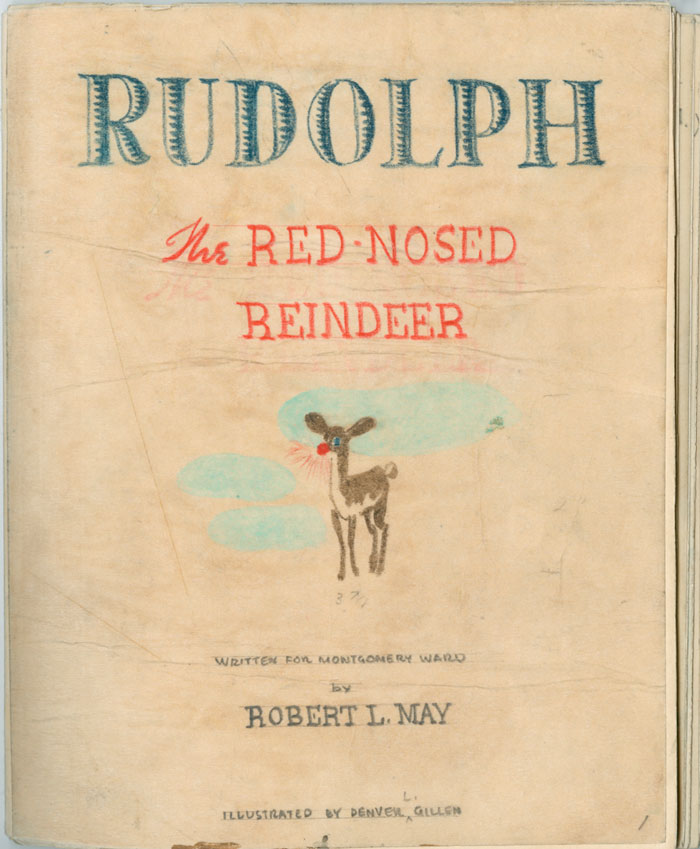 |
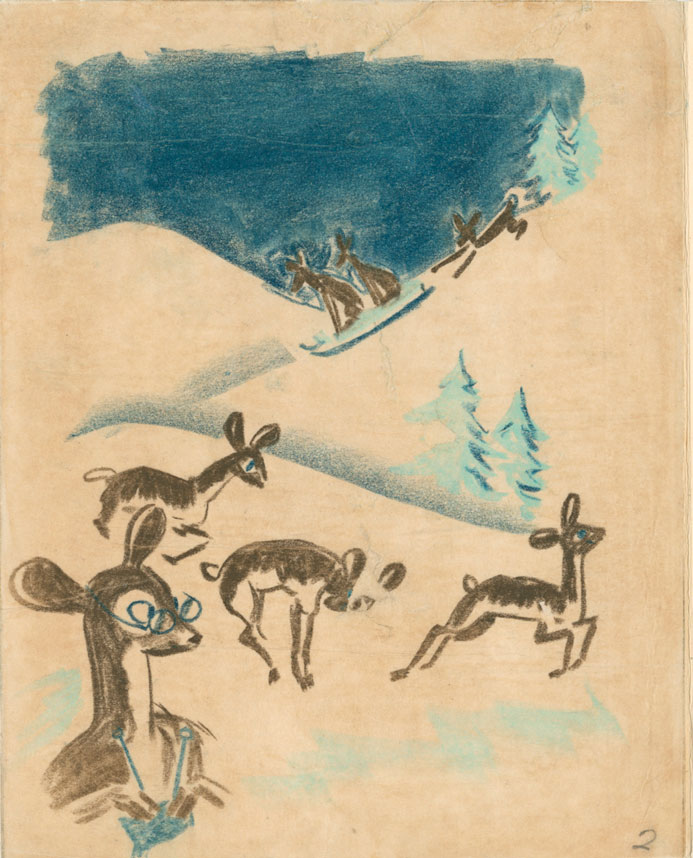 |
.jpg) |
.jpg) |
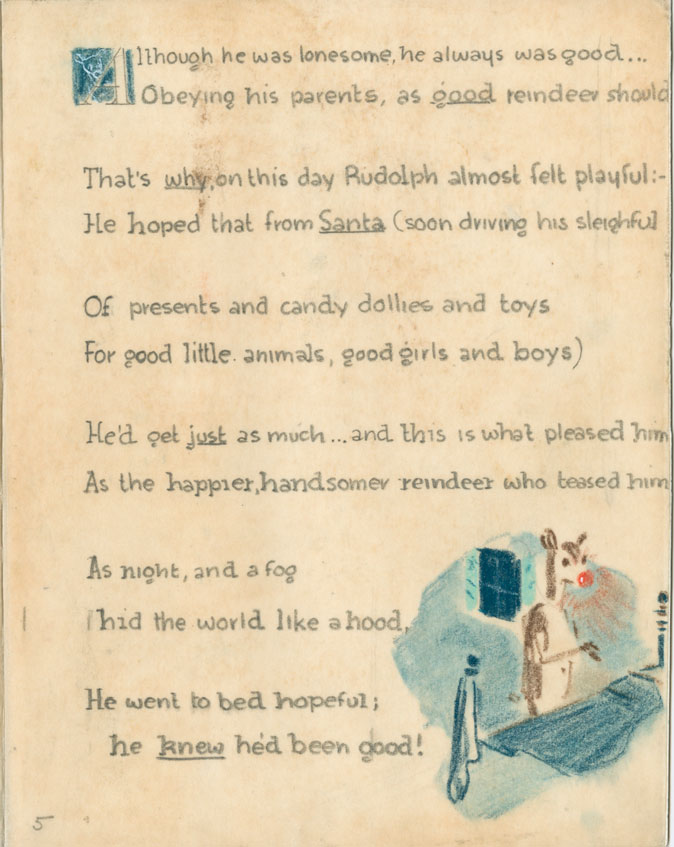 |
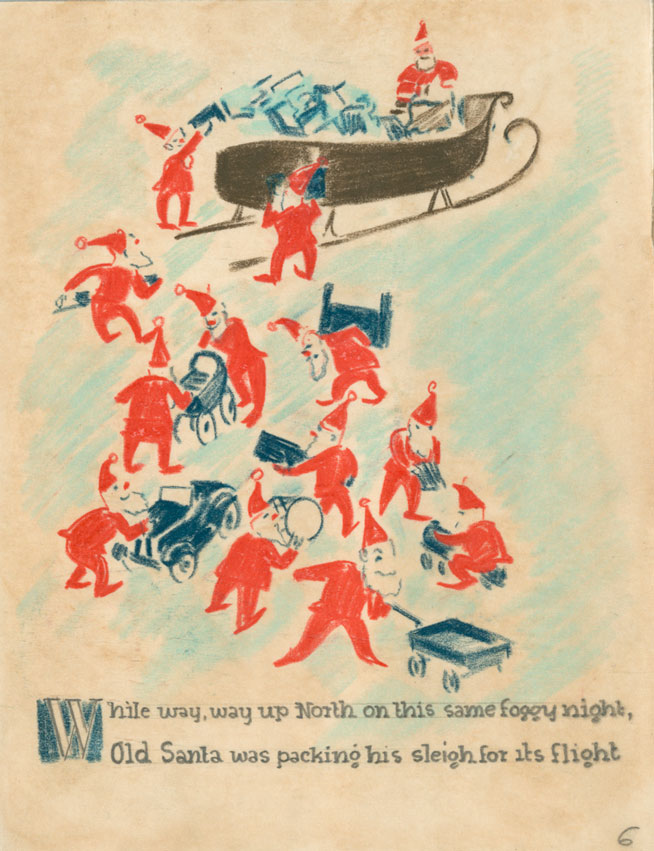 |
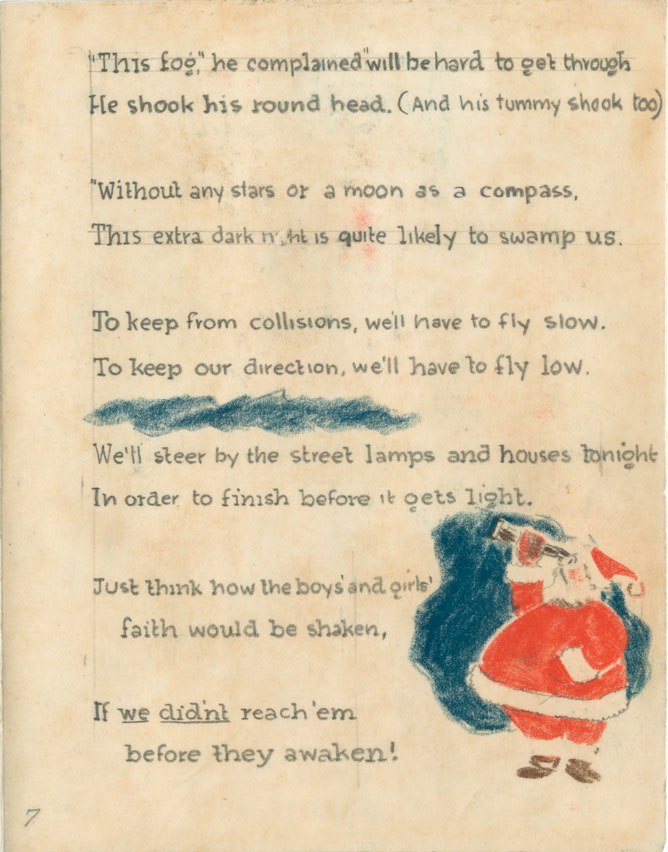 |
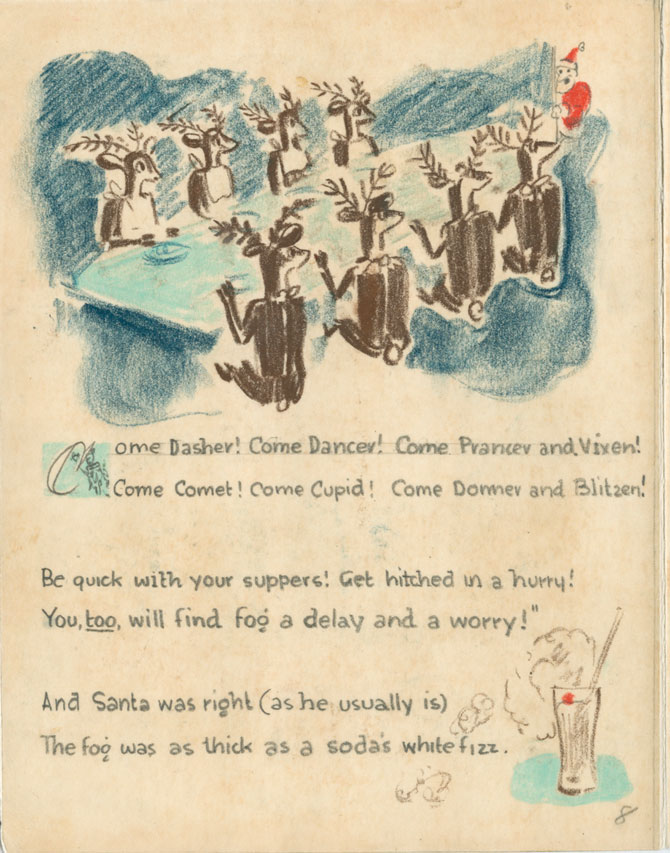 |
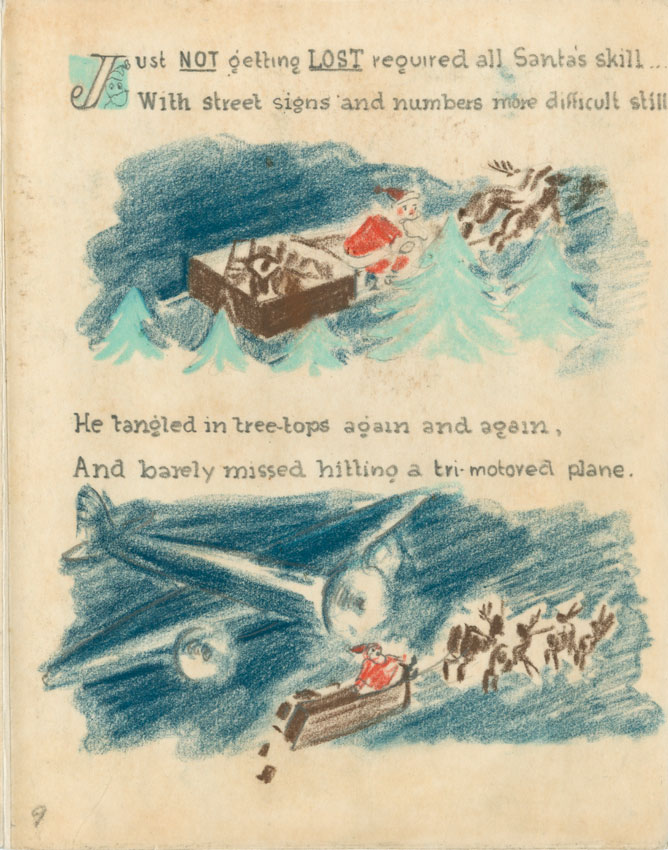 |
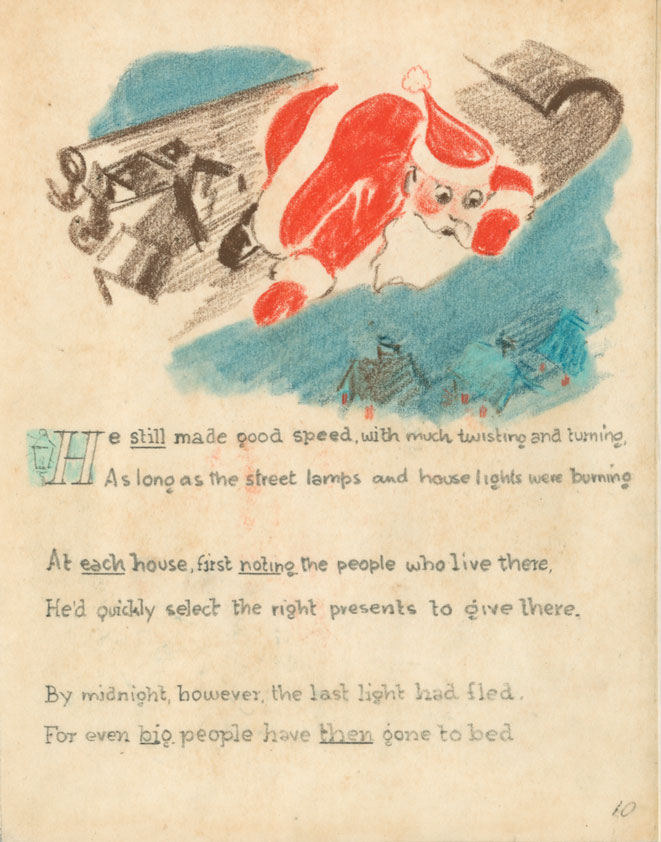 |
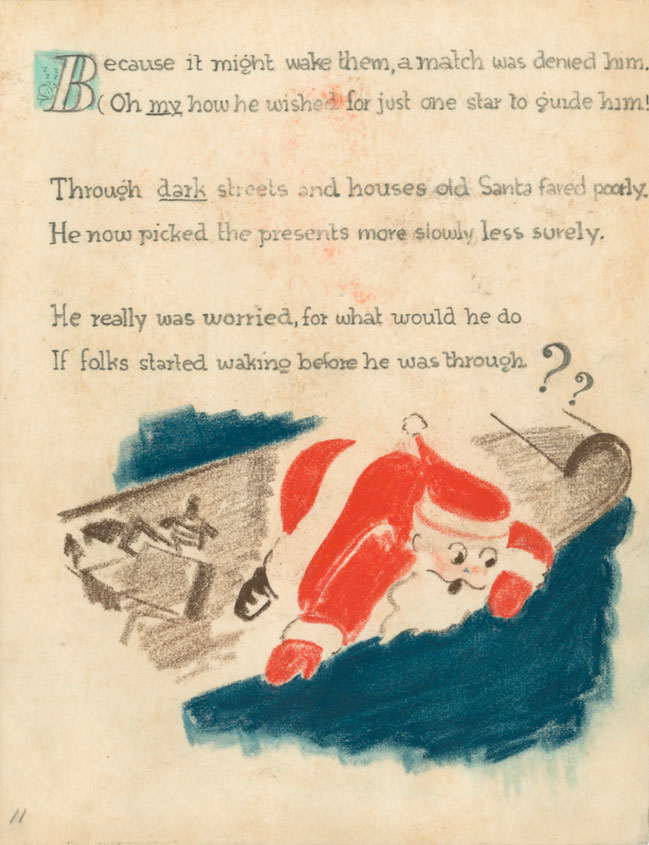 |
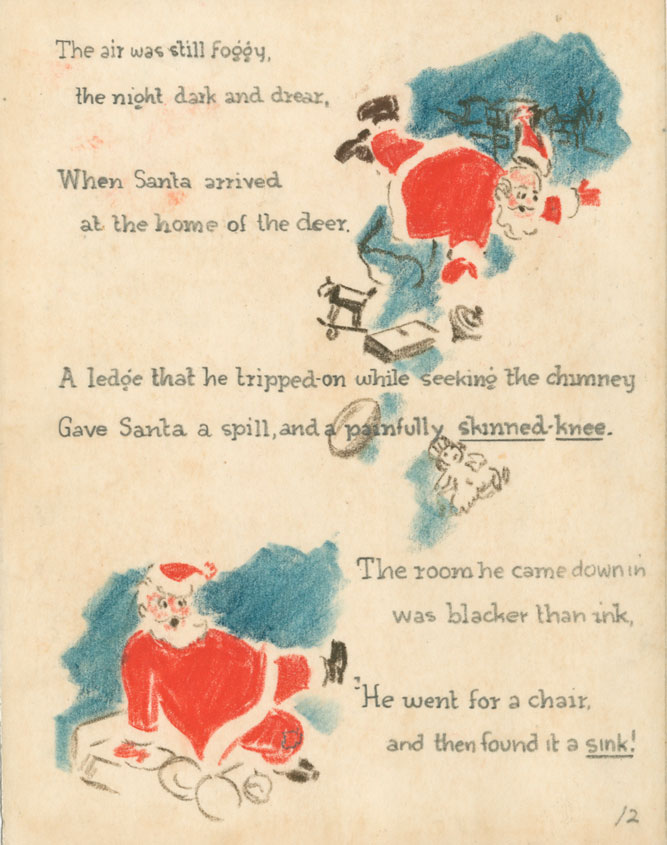 |
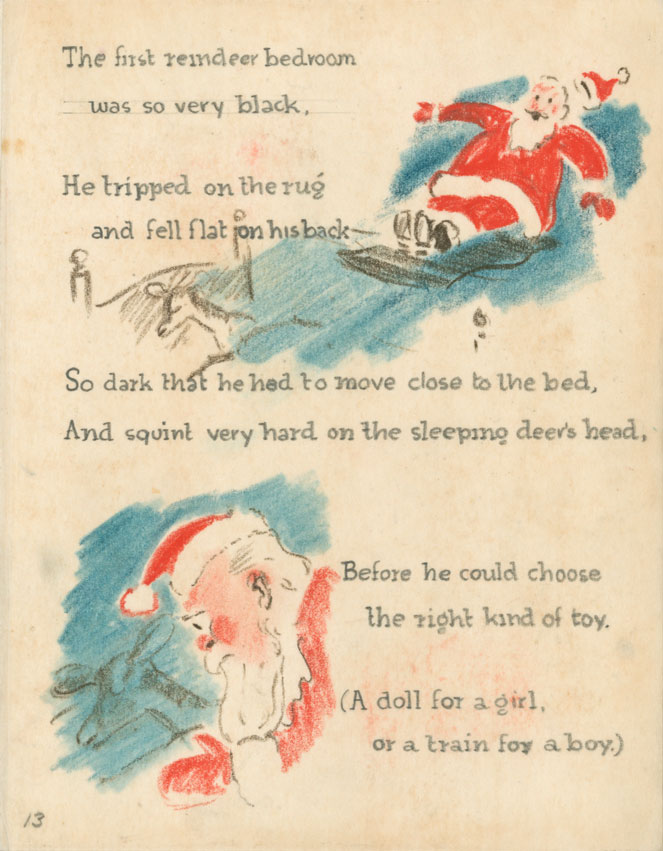 |
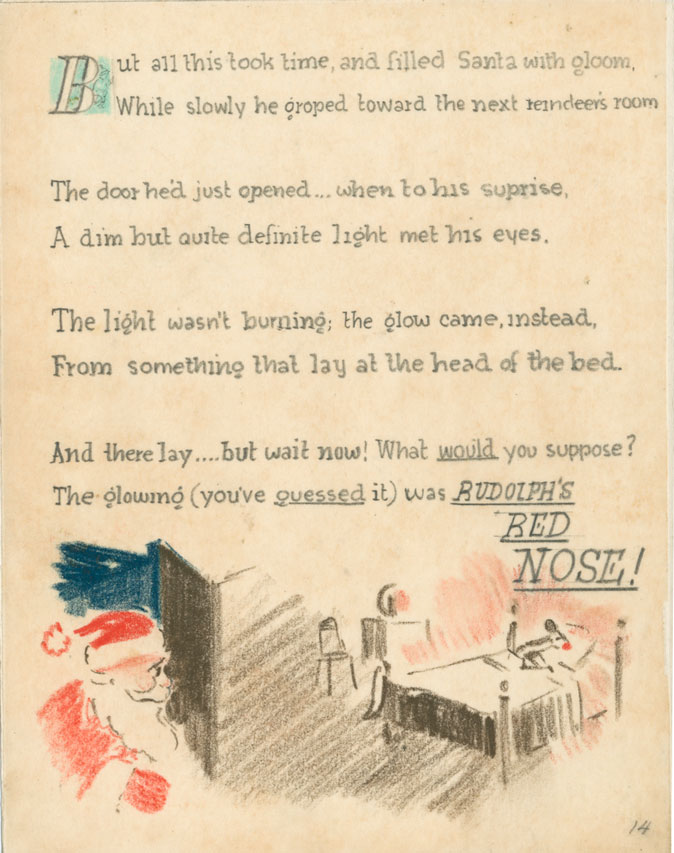 |
The Original Rudolph Manuscript & Sketches
Courtesy of Rauner Special Collections Library/Dartmouth College
In the interim, May married a fellow Montgomery Ward employee and became a father again, but he still struggled financially. In 1947, the retailer’s board of directors, stirred either by the holiday spirit or belief that the story lacked revenue-making potential, signed the copyright for “Rudolph the Red-Nosed Reindeer” over to May. In short order, May licensed a commercial version of the book along with a full range of Rudolph-themed merchandise including puzzles, View-Master reels, snow globes, mugs and slippers with sheep wool lining and leather soles.
In 1949, songwriter Johnny Marks, who happened to be May’s brother-in-law, set Rudolph’s story to music. After Bing Crosby reportedly turned down the chance, singing cowboy Gene Autry recorded the song, which sold 2 million copies in the first year and remains one of the best-selling tunes of all time.
The song and merchandise sales made May financially comfortable, but hardly rich. After leaving Montgomery Ward in 1951 to manage the Rudolph commercial empire, May returned to his former employer seven years later. He continued to work as a copywriter until his 1971 retirement. By the time he died five years later, “Rudolph the Red-Nosed Reindeer” had become a piece of modern folklore and a metaphor for overcoming obstacles, embracing differences and recognizing everyone’s unique potential.
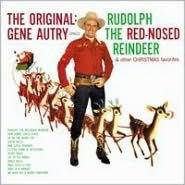 |
LYRICS You know Dasher and Dancer and Prancer and Vixen, Rudolph the Red-Nosed Reindeer All of the other reindeer Then one foggy Christmas Eve Then how the reindeer loved him |
|
Play recording by clicking on the arrow in the |
Rudolph the Red-Nosed Reindeer
1964 Movie
Rudolph the Red-Nosed Reindeer is a delightful animated television special, which was first aired Sunday, December 6, 1964 on the NBC television network. Since 1972 the special has aired on CBS with the network unveiling a high-definition, digitally remastered version of the program in 2005. It has been telecast every year since 1964, making it the longest continuously running Christmas TV special in history. 2014 marked the 50th anniversary of the television special and a series of postage stamps featuring Rudolph was issued by the United States Postal Service.
| Return to Index |


